Mayor Fires Oakland Police Chief LeRonne Armstrong
Chief Learns of His Firing by Watching TV Press Conference; Sheng Thao Jumps the Gun and Preempts Police Commission
By Ken Epstein
Oakland Mayor Sheng Thao announced this week that she has fired Police Chief LeRonne Armstrong, who had been on paid administrative leave pending results of an investigation into allegations that he mishandled two internal affairs misconduct cases against a police sergeant who was involved in a hit-and-run car crash and fired a gun in a police department elevator.
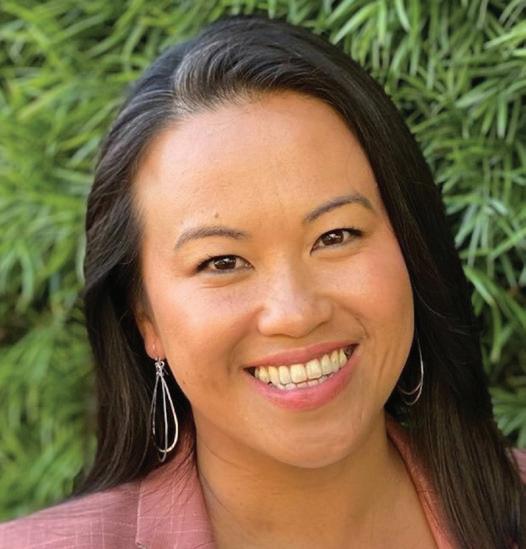
“I am no longer confident that Chief Armstrong can do the work that is needed to achieve the vision,” said Thao at a press conference Wednesday afternoon. “Oakland needs a police department that welcomes opportunities for improvement rather than immediately rejecting criticism.”
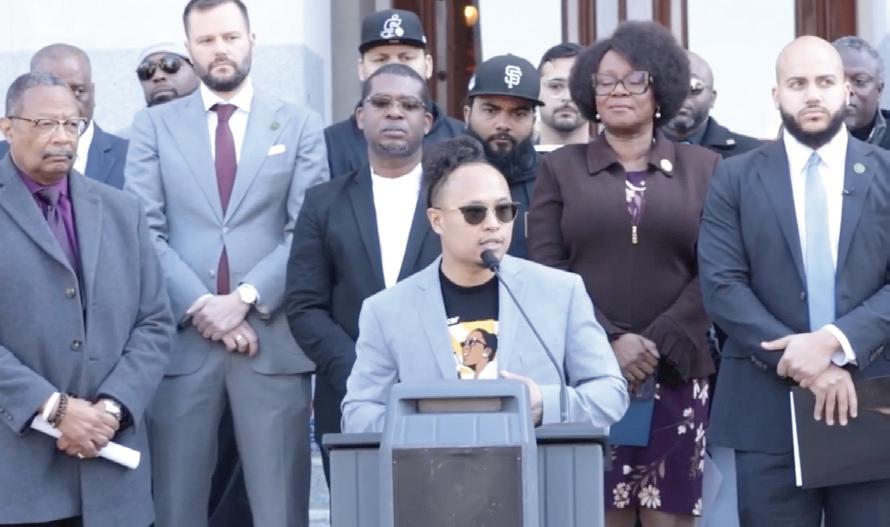
The mayor said she was concerned that Armstrong’s public statements in his defense minimized the significance of the misconduct cases that had been
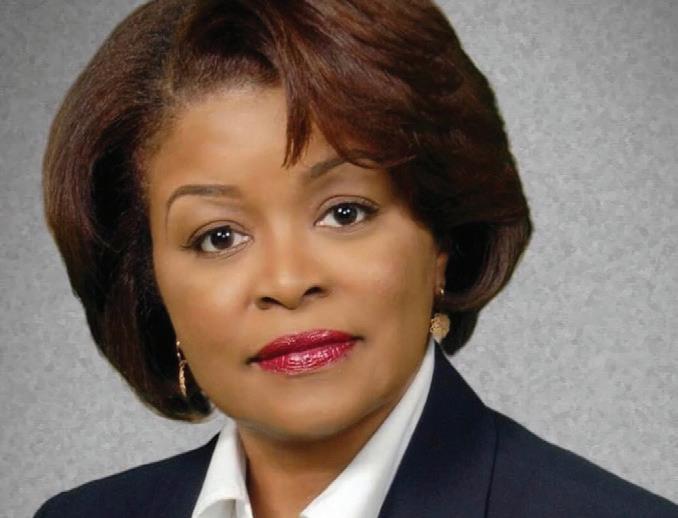
covered up during internal affairs investigations.
In a written statement, Mayor Thao said:
“I made a commitment, as your mayor, to ensure that the Police Department and the City can prove, once and for all, that Oakland is ready to ensure constitutional policing without federal oversight.
“Within days of being notified that the city needed time to carefully review the findings and evidence in these very serious cases, Chief Armstrong made a number of statements that troubled me.
“In response to a public report that concluded that OPD had repeatedly failed to rigorously investigate misconduct and hold officers accountable, Chief Armstrong said these were not incidents where officers behaved poorly. He stated that he did not believe these incidents reflected systemic problems,” she said.
“Instead, Chief Armstrong de-
scribed the underlying incident as a minor vehicle collision. He said that officers made ‘mistakes.’ He publicly stated that the sergeant involved in a vehicle collision was held accountable, disregarding the independent investigator’s findings of serious flaws in the disciplinary process.”
“It is clear to me that there are systemic issues the city needs to address and that we cannot simply write them off as mistakes,” she said.
Following his termination, Armstrong released the following statement to KTVU:
“I am deeply disappointed in the Mayor’s decision. After the relevant facts are fully evaluated by weighing evidence instead of pulling soundbites from strategically leaked, inaccurate reports, it will be clear I was a loyal and effective reformer of the Oakland Police Department.
“It will be equally clear that I
Opposition Grows Over Proposed 40-Story High Rise in Middle of City’s Black Arts District
in the last decade because of the city’s concentration on building housing that is not affordable to people who currently live in Oakland.
By Post Staff
An out-of-town developer is trying to build a 40-story highrise in the middle of Oakland’s Black Movement Arts and Business District against strong community opposition. At its meeting on Feb. 16, both the Planning Commission and the developer were called out by Oaklanders including the Oakland Heritage Alliance and a representative of minority builders.
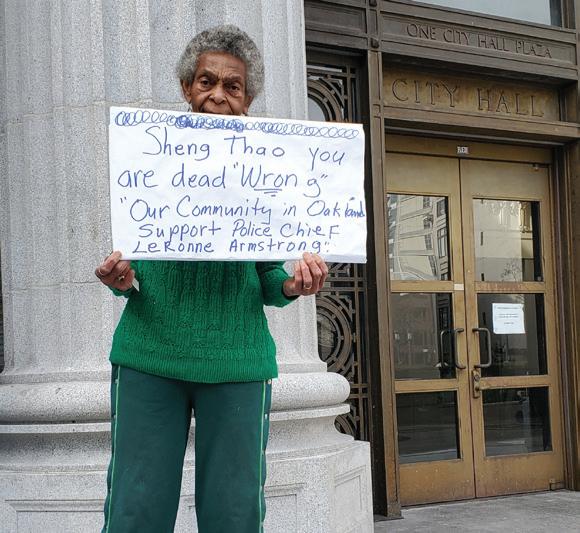
The Planning Commission acknowledged that they went through the entire design review process for the building without even knowing that the Black Arts and Business District existed!
The district was created in 2016 by city council resolution.
When the developers claimed to have Black support, Oakland community leader and owner of Geoffrey’s Inner Circle, Geoffrey Pete, quoted Harriet Tubman, “I freed a thousand slaves. I could have freed a thousand more, if they had known that they were
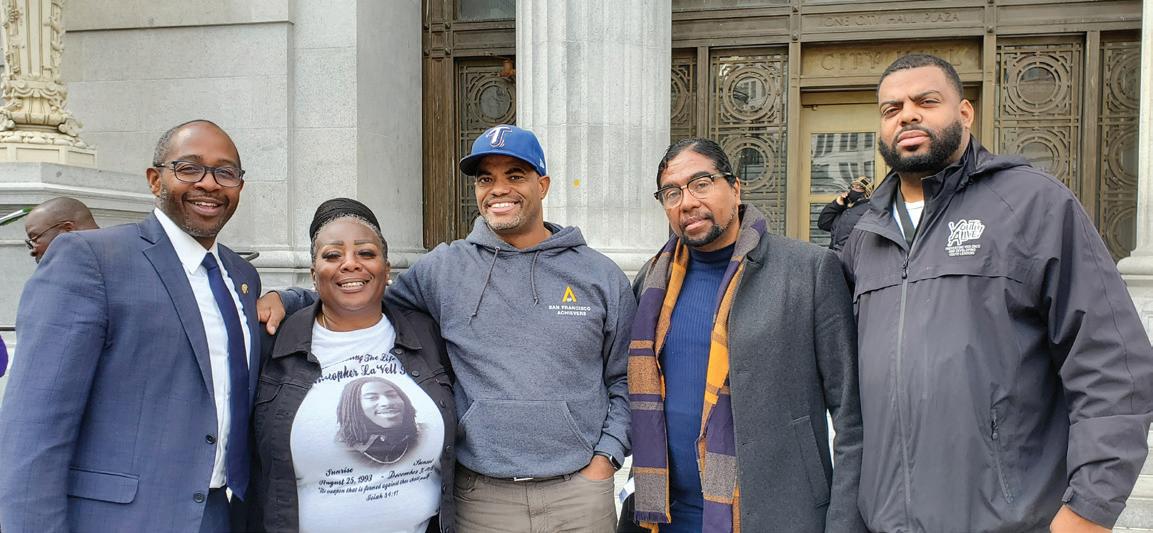
slaves.”
At the heart of the opposition to the building is the desire to further the legacy of local Black entertainment and entrepreneurship exemplified by businesses like Pete’s. His business is housed in a building that was once the all-white Athenian Club.

It is now a historic landmark and the venue for thousands of people who listen to jazz and other entertainment and hold wedding receptions and memorial services.
Geoffrey’s has hosted hundreds of homeless people for holiday dinners with table clothes and fancy cutlery and offered his venue for free to groups ranging from advocates for affordable housing to academics urging Black and Brown residents to become teachers.
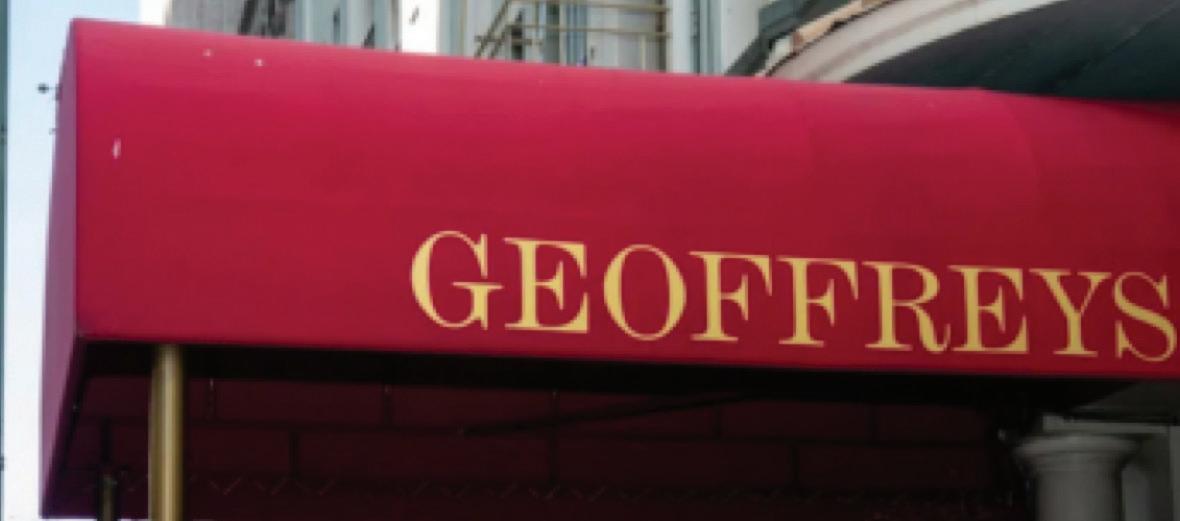
Residents are asking the city to make the Black Movement Arts and Business District real by investing in its corridor along 14th Street. The Black population of Oakland has decreased rapidly

committed no misconduct, and my termination is fundamentally wrong, unjustified, and unfair,” Armstrong continued. “I anticipate releasing a more detailed statement soon once I have the chance to fully digest the mayor’s remarks.”
The mayor had placed Armstrong on administrative leave on Jan. 19 following an investigation conducted by an outside law firm hired by the city into how the police Internal Affairs department conducted two investigations into Sgt. Michael Chung.
The report by the outside law firm, which was confidential but released by several news outlets, found that Chief Armstrong’s denials of involvement in the internal affairs case were not “credible” and that he had committed “gross dereliction of duty and performance of duty” for failing to hold subordinate officers accountable
Mayor Sheng Thao Announces Police Walking Patrols, Other New Safety Measures
By Ken Epstein
Oakland Mayor Sheng Thao held a press conference this week with acting Police Chief Darren Allison and small business leaders to announce new and strengthened public safety initiatives in the wake of the death of a popular Oakland baker who was killed
include new foot patrols, a vehicle enforcement unit, and a traffic division.
“Starting next week, you’ll see a return of our walking officers to our business and neighborhood shopping districts, said Acting Chief Allison. “This is a unit that hasn’t been in existence for the past two years.”

Mayor Sheng Thao also said the Oakland Department of Transportation is starting a new Vehicle Enforcement Unit that will “remove blighted and abandoned vehicles.”
Enhancing the Black Arts District could help to stop displacement. Approving this proposed building would further displacement by continuing the policy of approving developments that current Oakland residents cannot afford.
The new building would remove the only parking available in the area and threaten a historic brick building during construction. In addition, acknowledgement of racism and the experience of other cities tell us that new high-end housing developments drive out entertainment venues, especially those frequented by Black customers.
While some argue “we need housing,” others say this claim is disingenuous because this particular housing will displace more Black and Brown Oaklanders in favor of gentrification.
Said one opponent of the development, “If Tidewater wants to build in the Black entertainment district and help Oakland with housing, they should determine the rent level that the average Black family can afford and build for those families.”
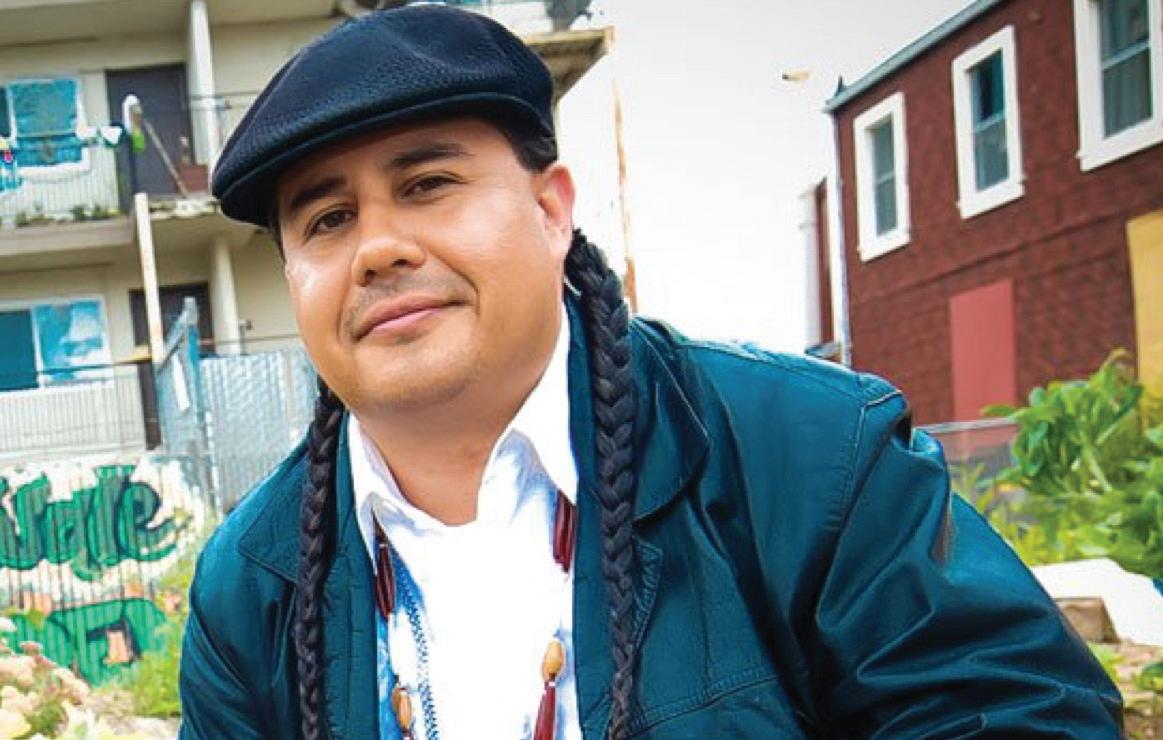
(The following statement is from the office of Rep. Barbara Lee:)
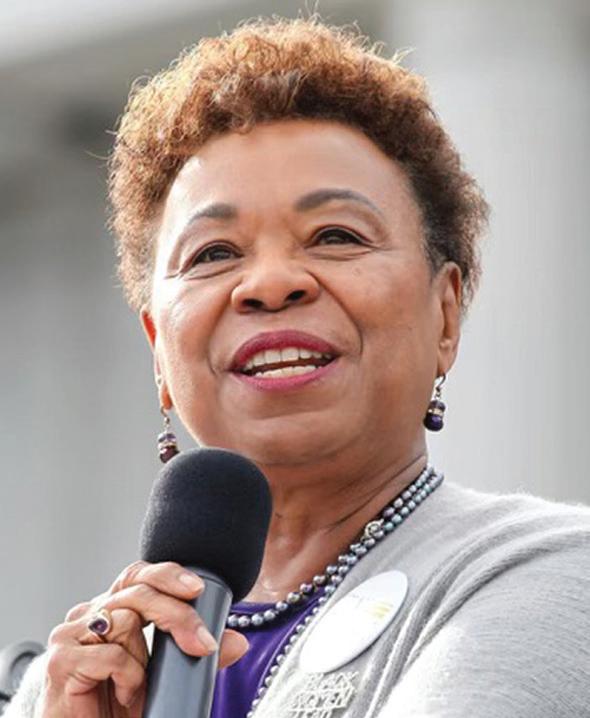
Senator Dianne Feinstein is a historic figure, a trailblazer, and a tireless advocate for the people of California and our country. Shattering glass ceilings, she served as the first female President of the San Francisco Board of Supervisors and the first female Mayor of San Francisco before being sent to Washington as California’s first woman U.S. Senator in 1992 along with Senator Boxer in the historic Year of the Woman, where she continued to challenge the status quo in Washington. Senator Fein-
during a smash-and-grab robbery.
“Oakland Mayor Sheng Thao has made public safety a top priority of her administration,” according to a city of Oakland media release. “Even as we work to address the root causes of crime, the city is taking steps to deter crime now and address the needs of residents, businesses and visitors.”
The public safety programs
stein has been a barrier breaker for all of us who have been inspired by her monumental career, myself included.
Her historic Senate career will be marked by her unwavering commitment to passing groundbreaking legislation. A champion for gun control, she passed the 1994 Federal Assault Weapons Ban that banned semi-automatic firearms and continues to be a vocal advocate against gun violence today. A protector of our natural environment, she passed the California Desert Protection Act that safeguarded more than 7 million acres of California desert wilderness. A fighter for women’s and
Alicia Kidd, owner of CoCo Noir wine bar in the downtown area, spoke at the press conference: “In order for Oakland to thrive 365, we need to have OPD, we need to have our community policing, as well as the community, to help continue our businesses and the safety of our customers and employees and owners.”
There is broad concern in Oakland about the rising rate of crime. In 2021, the city experienced 132 homicides and 119 in 2022, the last two years of former Mayor Schaaf’s administration.
human rights, she pushed the 2022 Violence Against Women Reauthorization Act and passed legislation to combat human trafficking and protect marriage equality.
While I hope we will keep the focus in these coming days on celebrating the Senator and her historic tenure in the Senate, I know there are questions about the Senate race in 2024, which I will address soon.
But for now, let me say I have been honored to serve beside Senator Feinstein in the California Congressional Delegation, and to the Senator, I’d like to say thank you for your enormous service to our state and country.
Oakland Post “Where there is no vision, the people perish...” Proverbs 29:18 postnewsgroup.com 60th Year, No. 7 Weekly Edition. February 15 - 21, 2023 Read the full story on postnewsgroup.com ‘ ‘ Lawmakers: Grant Prisoners the Vote... Page 2 Oaklanders & Tyre Nichol’s Death... Page 10 CA Black Legislators Black Hisory Month... Page 2 Post Endorses Linda Hudson for Alderman... Page 9
Congresswoman Barbara Lee on Feinstein’s Retirement
Community leader Brenda Grisham supports Armstrong’s “Loyalty and trust for the community where he grew up.” Many spoke of his family and their school experiences. One who had been incarcerated and remains suspicious of many OPD officers said, “Armstrong was politically strong-armed out of office so she (Mayor Sheng Thao) could appear to be tough.”Photo by Jonathan Fitness Jones.
Community Elder Rosalind Charlotte Patton, former member of the Black Panther Party, supports Armstrong. Photo by Carla Thomas
Congresswoman Barbara Lee (DCA) has filed papers to run for the U.S. Senate.
Community leaders Loren Taylor. Brenda Grisham, Tarrell Gamble, Jorge Flores, and Antoine Towers gather in support of ousted Police Chief LeRonne Armstrong outside Oakland City Hall at Oscar Grant Plaza. Photo by Carla Thomas
Oakland Mayor Sheng Thao
from
California Black Legislators Host Black History Month Activities
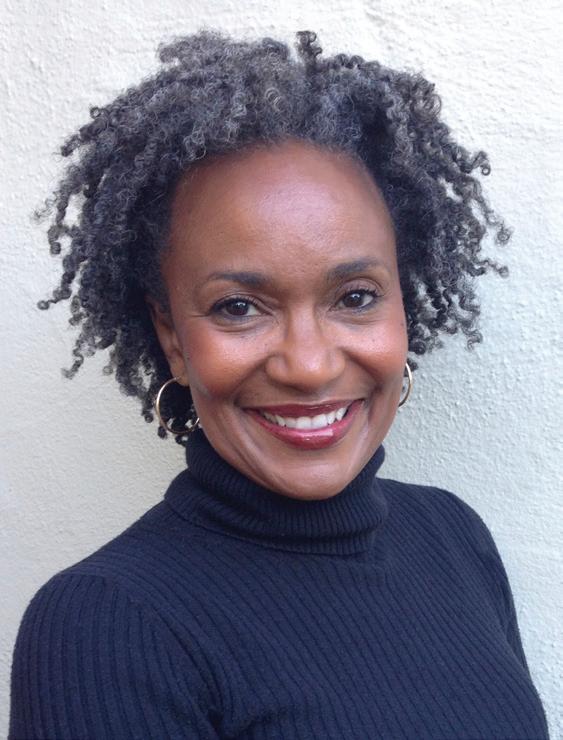
 By California Black Media
By California Black Media
This week, the California Legislative Black Caucus (CLBC) is celebrating Black History Month in Sacramento with its Annual Legislative Business Brunch, an event organized to honor Blackowned businesses across the state.
The brunch is the first in a series of commemorative events — including a cultural showcase, film screening and awards show — the CLBC is putting on to mark the month-long national observation of Black accomplishment.
“It is with great honor to serve as the Chair of the California Legislative Black Caucus and to collaborate with my 11 colleagues to carry out the vision set forth more than five decades ago to stand for equality, justice and opportunity for all Black Californians,” said Assemblymember Lori Wilson (D-Suisun City), who serves as chair of the CLBC.
“For us, Black History is every day. Annually, during the month of February, we are privileged to educate, celebrate, and honor our past struggles and accomplishments, and our future aspirations. Please join us in doing this good work together,” Wilson added.
Black History Month began as Negro History Week in 1926 with the vision of historian Carter G. Woodson.
In the 1920s and 1930s, Black newspapers played a critical role in promoting the establishment of the celebration, particularly among Black Americans at a time when racist Jim Crow laws existed on the books and discrimination was customary across the United
COMMENTARY: Readjusting Our Historical Perspective Can Guide Us
States, particularly in the South.
Black History Month has been recognized by every American president since 1976 when President Gerald Ford first celebrated it. Today, Americans of all races participate in Black History Month celebrations, which educate people from all backgrounds about the history of Black Americans and their contributions to the United States.
President Joe Biden, in his 2023 Black History Month proclamation, encouraged, all “public officials, educators, librarians, and all the people of the United States” to mark the occasion of Black History month with relevant programs.
“Black Americans’ struggles for freedom, equal treatment, and the right to vote; for equal opportunities in education, housing, and the workplace; for economic opportunity, equal justice, and political representation; and so much more have reformed our democracy far beyond its founding,” Biden said. “Black Americans have made a way not only for themselves but also have helped build a highway for millions of women, immigrants, other historically marginalized communities, and all Americans to more fully experience the benefits of our society.”
The CLBC was founded in 1967 to represent the legislative concerns of Black Californians. The organization has been fundamental in providing political influence for the support of racial and gender equality and promoting justice for poor and disenfran-
chised communities across California.
Here is the CLBC schedule of events celebrating Black History
Month:
Feb. 13, 10 a.m.
• Annual Legislative Business Brunch Honoring Blackowned businesses in partnership with the CA Black Chamber of Commerce
@ Citizen Hotel, 926 J St, Sacramento
Feb. 15, 1 p.m. – 5 p.m.
• “Birthing Justice” Screening & Conversation
In partnership with Blue Shield & Filmmaker Denise Pines
@ 1600 Capitol Avenue, Sacramento //
Feb. 17
• 2023 African American Leaders for Tomorrow (AALT)
Application Opens: https://bit.
ly/CLBC2023AALT
Feb. 27, 12:30 p.m.:
• Unsung Heroes Awards Recognition & Author Bryant Terry
@ State Capitol Assembly and Senate Floors
2 p.m.- 4 p.m.:
• Black Food: Stories, Art & Recipes from Across the African Diaspora
• Book Signing with Author / Educator / Chef Bryant Terry @ Ella Dining Room and Bar (1131 K St., Sacramento)
This California Black Media feature was supported in whole or in part by funding provided by the State of California, administered by the California State Library.
 By Ben Jealous
By Ben Jealous
Gov. Ron
DeSantis
continues to try to elevate his presidential chances while doubling down on banning Black history. Meanwhile, the rest of us would be better served by reading more of it. We should go even further by mining American history to find what’s been hidden from us by previous political opportunists that can give us blueprints for how to create a national politics of unity rather than division.
I decided to start by digging into my own family’s history. What I found shocked me.
At the end of the 19th century, my maternal great-great-grandfather, who had been born into slavery, helped build a political party called the Readjusters that took control of the state of Virginia. Here’s what got my attention — it was a multi-racial populist party led by a former Confederate general and a freedman that was proworkers’ rights, pro-civil rights, pro-voting rights, and pro-public education.
Stop here if anyone taught you that 15 years after the Civil War, Johnny Reb and the freedmen came together to form a new party that won elections for local, state, and federal offices.
How could people who had been enslaved come together with people who had fought a war to keep them in slavery? They all wanted a better future for their kids and to hold on to the new public schools their children attended.
At the time, plantation-class oligarchs were using the state’s Civil War debt as a wedge issue to anger whites. But their class bias pushed them too far. They said
they would shut down the newly created public schools to pay for the debt.
In response, many white men (remember only men voted in those days) whose families relied on and supported the schools fled the Democratic Party. They launched the Readjuster Party. Their name came from their demand: readjust the terms of Virginia’s Civil War debt to save the public schools. My grandmother’s grandfather, Edward David Bland, led the state’s Black Republicans into the Readjusters. It was an easy argument to make; after all Black Republicans had created the state’s public schools a little over a decade before. In the process, they became the majority of its new party’s base.
In less than five years, the Readjusters saved Virginia’s public schools, expanded Virginia Tech, and created what is now Virginia State University, the first publicly supported college for training Black teachers. They raised taxes on corporations and the property they owned, reversing a deficit into a budget surplus. They did away with the poll tax and with the public whipping post.
White men who rented their farms or were otherwise too poor to own land had only had the right to vote since the 1820s. Black men had only had it since the 1860s. And by the early 1880s large numbers of both groups had united in multiple states and were winning major political victories.
To break up a thriving coalition of Black and white farmers and workers, the old plantation owners turned to a tried-and-true playbook. They spread vile disinformation to make other whites
fear the loss of political superiority.
They accused Black men of fictitious crimes. The disinformation sparked violence in Danville where there was a majority Black city council and a fully integrated police force. Two white men responded to the propaganda by murdering whites and Blacks in the streets.
With the Readjusters defeated, white supremacist politicians went on to pass an annual poll tax (equal to $50 today). It slashed the Black vote by 80% and the white vote by 50% and it eventually was enshrined in the state Constitution.
By denying the vote to so many Blacks and low-income whites, white supremacists essentially outlawed the kind of multiracial coalition that had beat them in Virginia and was chalking up victories in other states.
Even when students learn about the poll tax, that’s not the story most are taught. It’s truly a lesson in the promise of the power of coming together. It’s also a lesson in the lengths to which wealthy special interests will go to divide us.
Meanwhile, that’s a lesson that DeSantis and his wealthy donors are teaching us again. After all, it’s the history we forget that is most easily repeated.
Ben Jealous is incoming executive director of the Sierra Club, the oldest and most influential grassroots environmental organization in the country. He is a professor of practice at the University of Pennsylvania and author of “Never Forget Our People Were Always Free,” published in January.
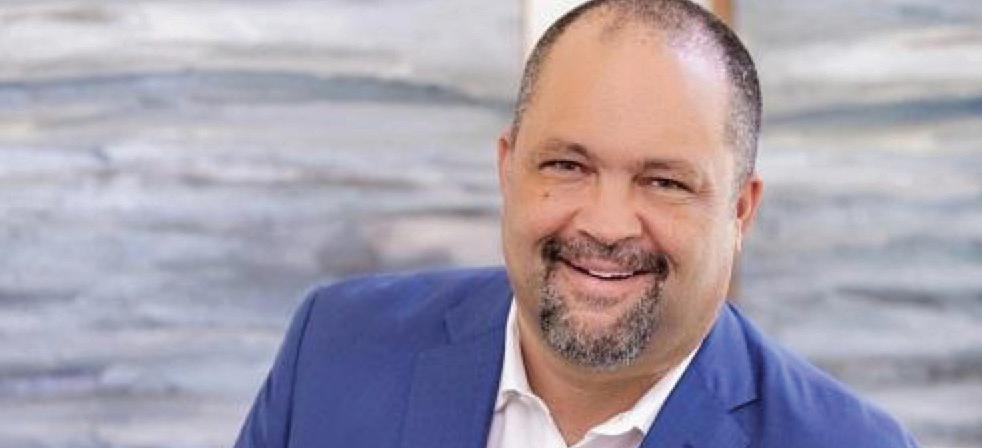
Lawmakers Push Bill to Grant Prisoners Right to Vote OCCUR, SF Foundation Offer Proposal
Virtual
By Carmen Bogan, MBA
The San Francisco Foundation (SFF) and OCCUR are bringing back workshops to help small nonprofits, especially those run by faith-based groups, to raise money to support their work.
Under SFF’s program called A Model Built on Faith (AMBOF), 2023’s Impact Series of workshops is about making a significant community impact.
The first one, held via Zoom on Feb. 23, is titled “Getting Funded
Elements of
Finish.”
“Two of the biggest challenges facing faith and nonprofit leaders continue to be raising funds to support their work and finding skilled grant writers who can bring in the needed financial resources,” says Carmen Bogan, MBA, CEO, the Bogan Group, LLC.
“Foundation grants are just one part of the funding portfolio puzzle. An individual with solid, basic grant writing skills can successfully approach all types of funders from foundations and corporations
By Maxim Elramsisy California Black Media
Last week, Assemblymember Isaac Bryan (DLos Angeles) the chair of the Assembly’s Committee on Elections introduced Assembly Constitutional Amendment 4 (ACA-4). The legislation proposes amending the California Constitution to allow felons serving time in state and federal prisons to vote.
Proposition 17, approved in 2020 by California voters, enabled persons convicted of felonies on parole to vote.
If the bill passes the Assembly and Senate, and the governor approves it, voters in California could vote to join Vermont, Maine, and Washington, D.C. in allowing incarcerated individuals to vote.
“After the 13th Amendment liberated the slaves, we started to see different types of voter disenfranchisement occurring,” Bryan explained in an interview with California Black Media (CBM).
“We saw Black codes, we saw Jim Crow, poll taxes, literacy tests, felony disenfranchisement, becoming more commonplace in statewide constitutions and so it’s through that legacy that we’ve been trying to roll back all of these years and make sure that our democracy is inclusive of everybody,” Bryan commented on the systemic discrimination and disenfranchisement African Americans have endured over centuries.
Lawmakers opposing the legislation say allowing incarcerated felons to vote is a slap in the face to victims of the crimes they committed.
“I believe that it discounts the impact that this will have on people who have suffered being a victim of a very violent offense,” Assemblymember Tom Lackey (R-Palmdale) told CBM.
“Part of rehabilitation is going through a process of recognizing the seriousness of what has been done, and I think when we allow someone to exercise the most sacred privilege that we have in this country, that Continued on page 8
Part
Proposal Writing from Start to
1:
Successful
postnewsgroup.com THE POST, February 15 - 21, 2023 Page 2
Writing Workshops for Small Nonprofits
workshop on Feb. 23, 2023
Ben Jealous
Bryant Terry, chef in residence at the Museum of the African Diaspora, will receive an award
CBLC on Feb. 27. Facebook photo.
Assemblymember Isaac Bryan announces ACA 4 the Bill will restore the voting rights of people who are incarcerated across the state alongside advocates and supporters. Feb. 8, 2023.
Carmen Bogan is the CEO of the Bogan Group, LLC.
Continued on page 9
Memphis Police Murder Case Puts Spotlight on California GrandparentLegislation
maud Arbery, George Floyd, and countless others, the California Black Freedom Fund is a five-year, $100 million initiative created to mobilize the resources necessary to build Black power and eradicate systemic and institutional racism.
The coalition leaders posted on cablackfreedomfund.org a letter reminding the public of the protests that gave voice to collective outrage, frustration, and grief that permeated Black communities and communities across the country in 2020.
“America recognized that the problem lies not within Black communities, but within structures that institutionalize and perpetuate racial violence and inequity,” they wrote.
Nationally, police killed at least 1,176 people in 2022 — about a hundred a month — making last year the deadliest year on record for police violence since killings began being tracked, according to Mapping Police Violence.
vestment with other policies.
The CPUC held its 20th Annual Supplier Diversity En Banc, “Implementing Best Practices to Reshape the Future of Supplier Diversity,” in October 2022, highlighting the efforts of investorowned utilities’ efforts to support diverse suppliers.
in 2021 over 2020, and generally increased spending with diverse subcontractors by 30%.
By Charlene Muhammad California Black Media
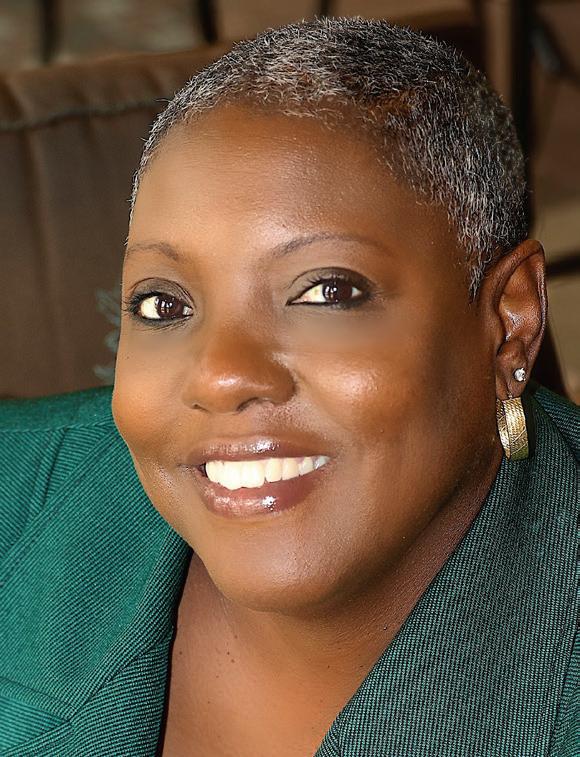
There was no “protect and serve.” Just an out of control and outside-the-bounds-of-their-authority attack on an unarmed Black man, said Sen. Seven Bradford (DGardena).
Bradford was referring to the beating death of Black motorist Tyre Nichols in Memphis, Tennessee, on Jan. 7.
The Memphis Police Department has terminated the five officers involved in Nichol’s death: Tadarrius Bean, Demetrius Haley, Desmond Mills Jr., Emmitt Martin III and Justin Smith. Each one was indicted on a second-degree murder charge and faces up to 60 years in prison if convicted.
Since the incident, Memphis Police Chief Cerelyn “CJ” Davis has deactivated the city’s SCORPION (Street Crimes Operations to Restore Peace in our Neighborhoods) unit. The 50-person unit of crime suppression officers was launched in 2021 to patrol the city’s hot-spot crime areas.
“The beating and murder of Tyre Nichols by five Memphis Police Officers is brutal and heartbreaking,” said Bradford. “This is yet another example of the need to hold police officers accountable regardless of the color of their skin.”
In 2021, Bradford authored Senate Bill (SB) 2. The law creates a process to make sure police officers who break the law can never wear a badge again in California. “This legislation will save lives,” he said.
Bradford is currently working on SB 50, which would prohibit police in California from making traffic stops for low-level violations. This will reduce the potential for more harm to innocent citizens, said the lawmaker.
“We tend to pass a lot of legislation that doesn’t really have a lot of binding power,” said Cephus “Uncle Bobby” Johnson. His nephew, Oscar Grant, III was shot in the back while subdued on a Bay Area Rapid Transit District station platform on New Year Day in 2009.
The George Floyd Justice in Policing Act does not adequately address some of the most critical issues that we’re dealing with, said Johnson, referring to the bill named for the 46-year-old Black
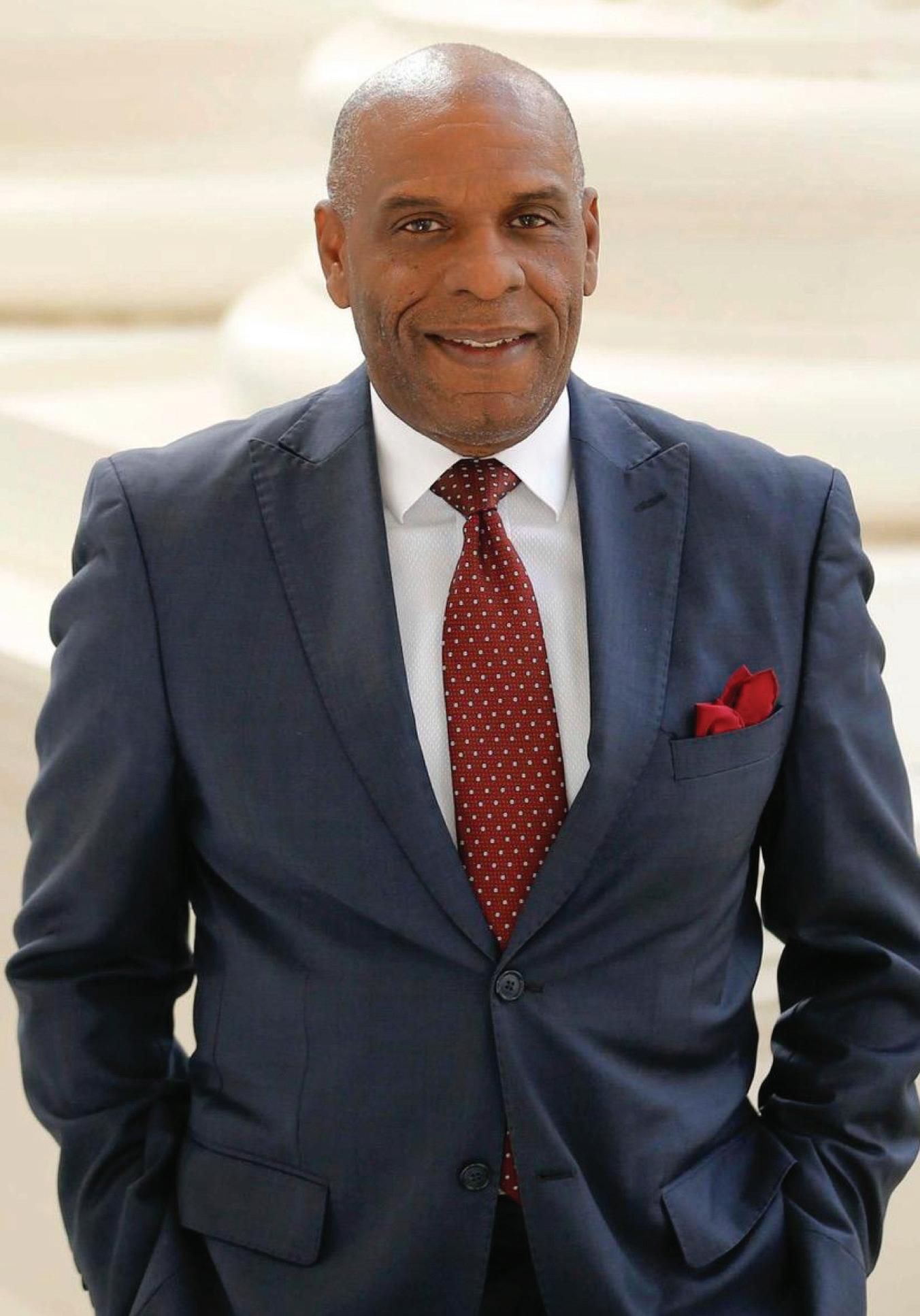
man who was murdered by white cop Derek Chauvin in Minneapolis on May 25, 2020. The officer was convicted of second- and thirddegree murder and manslaughter.
The bill would end police restraint techniques, including chokeholds and carotid holds, at the federal level as well as improve police training.
More money for training has been part of the problem, according to Johnson, who supported Assembly Bill (AB) 392, the California Act to Save Lives, which mandates that police officers should only use deadly force when necessary. It was introduced by California Secretary of State Shirley Weber when she was a San Diego Assemblymember. Gov. Gavin Newsom signed that bill in 2019.
“What happened to Tyre impacted so many in California. It re-traumatized many of the families,” said Johnson. “Many families’ wounds have been reopened. Many families’ hopes that there has been some progress have been totally erased,” continued Johnson.
Los Angeles Police Department had a similar program to SCORPION. It was called CRASH (Community Resources Against Street Hoodlums). In the late 1990s, about 70 officers in the Rampart police division were found to have acted like the gangs they were supposed to investigate: planting evidence, framing suspects, and stealing drugs and money.
In Oakland, a group of cops dubbed the “Riders” stood trial for beating, planting evidence on, and stealing drugs and money from alleged suspects in 2000. But a deadlocked jury acquitted them of eight charges and a judge declared a mistrial after they could not agree on 27 other charges. The officers went free.
“Initially, it looks like they’re doing great things but behind the scenes, people in communities will tell you they are terrorized by them,” said Johnson. Marc Philpart, executive director of the California Black Freedom Fund, organized 26 foundation CEOs and leaders to issue a call to action to push back against systemic barriers. Established two and a half years ago following the murders of Breonna Taylor, Ah-
“While the nation is grieving, some are making statements telling Black people how to express their outrage. That’s not the focus of our letter. Our letter is a call to action for everyone concerned with the brutalization of Black people and Black communities,” the leaders wrote.
During a Jan. 29 protest for Nichols and 31-year-old Keenan Anderson, who died after being tasered by Los Angeles police on Jan. 3, Dr. Melina Abdullah, co-founder of Black Lives Matter L.A. and Black Lives Matter Grassroots, said outrage over the police-involved murders of Black men is justified.
“We should shed tears. We should feel it. We should refuse to become numb. Our hearts should break,” shouted Abdullah.
“We should allow ourselves to sob in the dark of the night. And we should demand justice, not just for what’s happening in Memphis, but what’s happening right here in L.A.,” said Abdullah to demonstrators blocking the intersection of Lincoln and Venice boulevards. The location is where Anderson, a cousin of Black Lives Matter Movement co-founder Patrisse Cullors, flagged down a Los Angeles Police Department motorcycle officer seeking help following a traffic collision.
Anderson died in police custody hours later, after being tasered six times on the back of his heart, according to family attorneys. LAPD body cameras detailed what happened during the minor traffic stop, when a man, afraid, called the police for help, said family attorney Carl Douglas. In every way, Anderson was respectful of authority: “Sir! Help me, sir,” the unarmed and compliant man repeatedly pled, Douglas said.
“That officer then calls for backup, and Keenan sees several officers then rushing toward him. His reaction then was a reaction that several Black men would react in a similar situation, one of fear. And that fear drove him to run into the middle of the street,” stated Douglas.
Back in Memphis, Nichols’ brother Michael Cutrer urged people to stand together and fight for their rights. “We definitely speak loud and proud, and we are there marching and protesting and all that’s great, but it has to be about something,” he said.
By Holley Joy
Each year the California Public Utilities Commission (CPUC) shines a light on California’s investor-owned utilities’ efforts to boost local economies through working and spending with diverse suppliers.
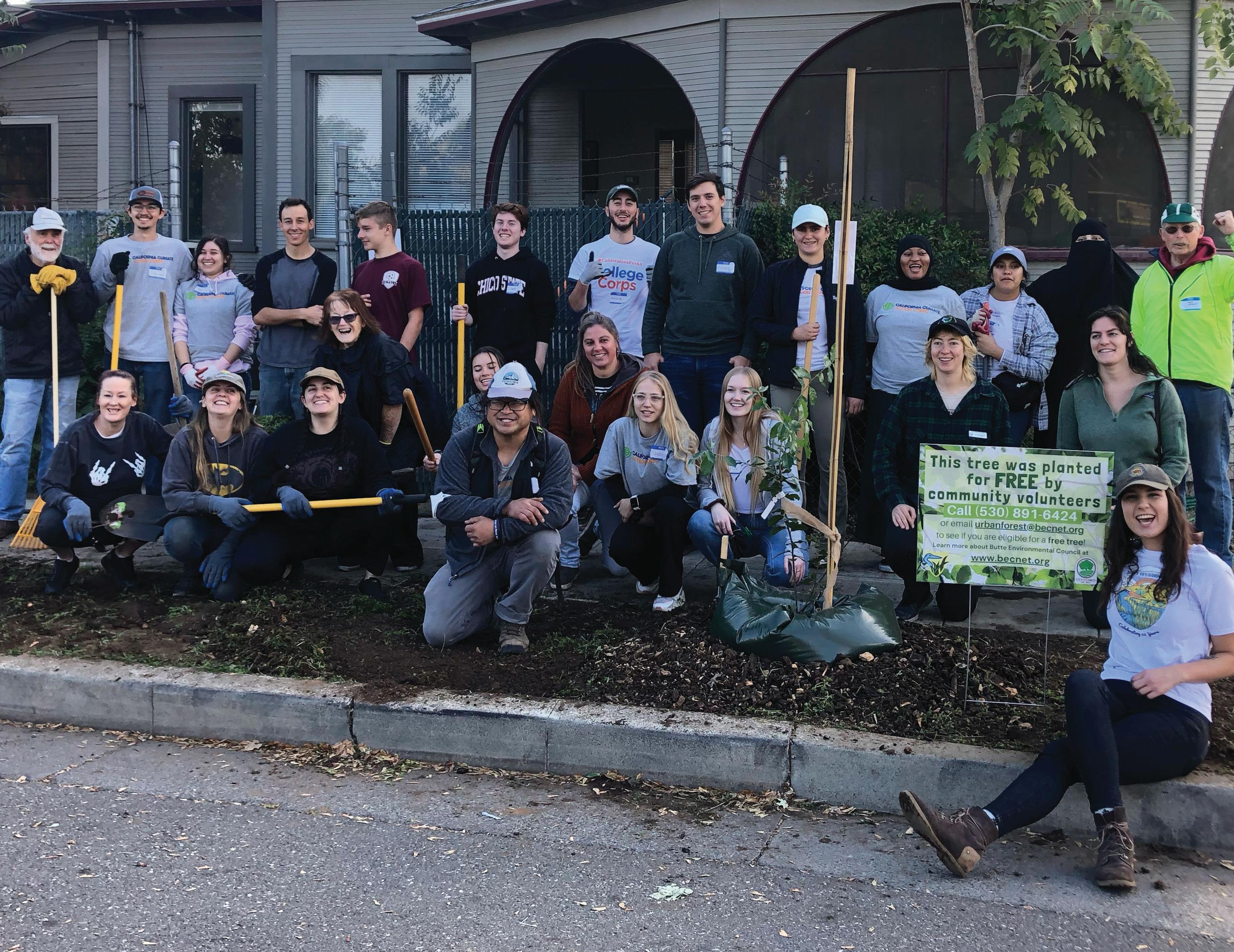
Black businesses benefit from some of this investment, and I am working to grow that share as one of my New Year’s resolutions. We should celebrate the CPUC for emphasizing investment in diverse suppliers and push the Commission to avoid undermining this in-
The California Water Association (CWA), which represents regulated utilities providing water to more than 6 million Californians, has a long-established supplier diversity commitment to help members work with businesses owned by women, minorities, disabled veterans, members of the LGBTQIA community, and persons with disabilities.
As a result of our industry’s commitment, an average of 37% of the contractors used by California’s seven largest investorowned water utilities are owned by a diverse supplier. That equates to nearly $750 million invested in diverse suppliers and contractors in 2021 alone.

One of California’s utilities increased water and wastewater treatment spending with disabled veteran-owned businesses by 35%
A3K Consulting, an African American woman-owned consulting firm, worked with the CWA over the past year to design and create a strategic plan, which has been adopted by the association’s 80+ investor-owned member utilities and addresses diversity, equity, inclusion, water quality, and water safety, all of which are issues critical to our community.

I want to see more participation by Black-owned businesses, which is currently less than 1% of the otherwise impressive total diverse spend by water utilities.
How do we increase this percentage?
Seven investor-owned water utilities collaborate annually to present two events to offer a more personalized approach for suppliers and utility buyers and staff to get to know the people behind the business enterprise.
When you know the people you’re doing business with and can trust their integrity, character, and skills, there is greater opporContinued on page 8
THE POST, February 15 - 21, 2023, Page 3 postnewsgroup.com Apply Now! Scan the QR code or visit: WWW.CACOLLEGECORPS.COM
BUILD SKILLS HELP OTHERS EARN MONEY
With the right policies and practices, we can do more in 2023 and beyond
Sen. Seven Bradford (D-Gardena).
With the right policies and practices, we can do more in 2023 and beyond
Reparations Task Force: Freedmen’s Bureau Essential for Compensating Slave Descendants
By Antonio Ray Harvey California Black Media
The members of the California Task Force to Study and Develop Reparations Proposals for African Americans are preparing the pretext for recommending a modernday Freedmen’s Bureau that will be critical for compensating descendants of enslaved Blacks for the injustices of slavery and Jim Crow discrimination they suffered.
Task Force Chairperson Kamilah V. Moore explained during the group’s two-day meeting at San Diego State University (SDSU) that the proposed California American Freedmen Affairs Agency (CAFAA) would identify past harms and prevent future occurrences.
Moore said that the agency would be “a main office or headquarters,” with “specialized offices and branches” dedicated to addressing specific atrocities that have “snowballed over generations.”
“The purpose of this new agency would be to identify how past state-sanctioned atrocities have perpetuated and created new iterations of these badges and incidences of chattel slavery,” Moore said.
“And how (the agency can) eradicate and prevent future ... incidences from forming and prospering against the American freedman or descendant community,” she added.
The CAFAA would facilitate claims for restitution and would set up a branch to process claims with the state and assist claimants in proving eligibility through a “genealogy” department.
In addition, the CAFAA would implement the recommendations made by a reparations tribunal to settle claims for past harms and set up an office of immediate relief to expedite claims.
Task force member and civil rights lawyer Lisa Holder said the proposed agency bears a resemblance to the federal agency set up on March 3, 1865, two months before the official end of the Civil War.
The Freedmen’s Bureau, as it was named under a series of post bellum legislations, was originally designed to settle the formerly enslaved on land confiscated or abandoned during the war.
The Freedmen’s Bureau, officially known as the Bureau of Refugees, Freedmen and Abandoned Lands, assisted formerly enslaved people in acquiring relief, housing, employment, education, medical aid, and equality under the U.S. Constitution.
Holder said that the “original Freedmen’s Bureau” was “interrupted and disrupted” when it could have been a “powerful” institution 100 years later if it “had been allowed to survive and thrive,” she said. According to the Freedmen’s Bureau National Archives at www.archives.gov, the bureau ceased operations in 1872 due to the lack of funding and “deeply held racist attitudes.”
Holder added that the CAFAA
should be the “guiding light” behind reparations efforts in the state of California.
“One of the things I like about this notion of a Freedmen’s Bureau is that it’s in keeping with this concept that reparations and damages for human rights abuses have to create systems that end the harm that causes the harm,” Holder said.
“It is also supposed to create institutions that make the community whole in a sense that they get you up to a place where you were before the harm happened.”
Elmer Fonza of Las Vegas and his elder brother Medford Fonza, who lives in the Los Angeles area, have attended task force meetings and activities around the state. Their great-great-great- grandfather Nelson Bell was brought to California as an enslaved person around 1850 to mine for gold. He was later freed.
Bell purchased land in Coloma, 48 miles east of Sacramento, but the family lost it all after he died in the 1870s, the brothers told the task force at the September meeting in Los Angeles. Elmer Fonza believes that the property was confiscated through unscrupulous means.
The Fonza family, who visited and toured Gold Country last summer for the first time in their lives, wants to know how they can benefit from an agency such as CAFAA.
“Now, as we gather more evidence, we want to file a claim through reparations to see if we lost anything or could gain anything,” Fonza said. “We want to know if such an agency (CAFAA) could help us facilitate the process. Right now, we don’t know how that would be done.”
How the CAFAA can be used to determine reparations eligibility for Black Californians has been a topic of public discussion by Black grassroot organizations
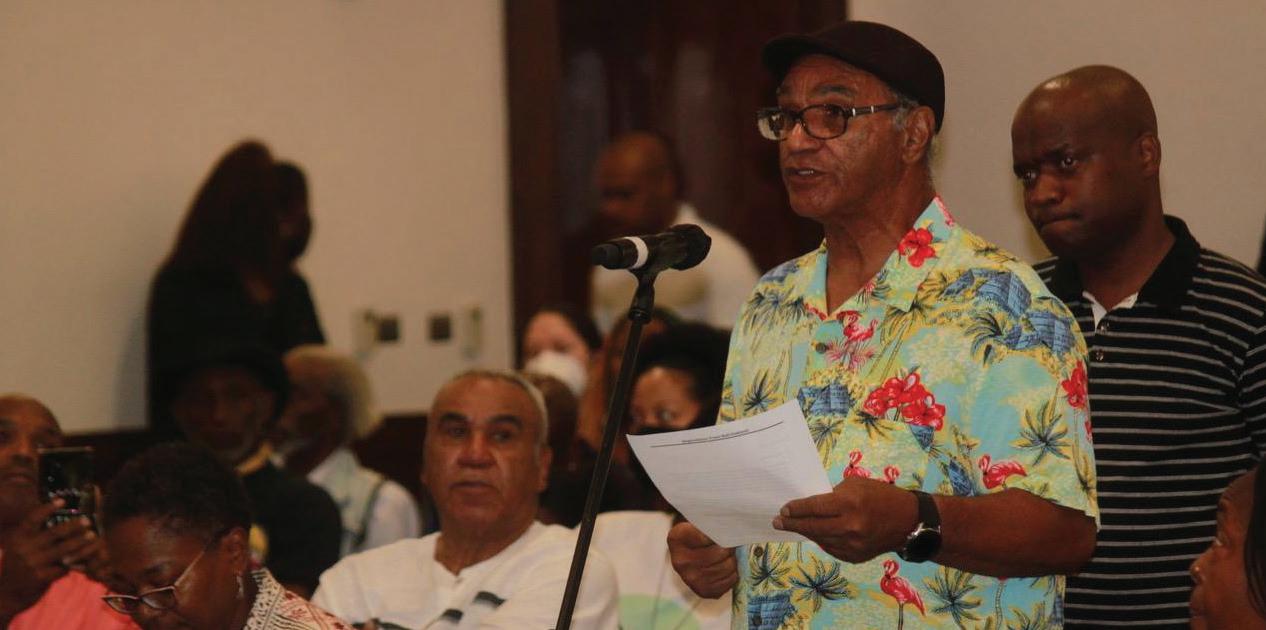
started before the task force was formed in May 2021. Now it can be addressed. Thanks to new laws that can help reparations eligibility, supporters say.
For the first time in California and American history, a specific category of data collection will be required for African Americans who are descendants of persons enslaved in the United States and living in California, starting with the state’s 2.5 million employees.
California is the first state to require its agencies to present a separate demographic category for descendants of enslaved people when collecting state employee data. Gov. Gavin Newsom’s 20222023 budget trailer bill — Senate Bill (SB)189 — includes language directing state agencies to disaggregate or use separate data collection categories for different Black or African American subgroups.
The State Controller’s Office administered by Malia Cohen and the Department of Human Resources can start collecting this information as soon as Jan. 1, 2024.
The Task Force affirmed lineage-based eligibility for California Reparations in March 2022. The 5-4 majority decision by the task force determined that descendants of enslaved people or free Black people in the United States as of the 19th century are the only group of people eligible for any future cash payments.
“There was great care and intentionality around the creation of this proposal, our proposal in the Interim Report that we released almost a year ago,” Moore said of CAAFA. “It just flushed out more to make all the proposed agencies fully reflect the totality of what we discussed in our 500-page report.”
The reparations task force’s next meetings are on March 3 and March 4. Times and location have yet to be announced.
Using a Bicycle, Author Follows Roads to Freedom Taken by Harriet Tubman on Underground
By Terri Schlichenmeyer
The Bookworm Sez, LLC

It’s all in the balance.
You need to maintain that first and everything else comes next. Without balance, you can’t pedal and the wheels won’t turn. Without balance, you’d dream of a place with no chance of biking there. No balance, no movement — and, as in the new book, “On Freedom Road” by David Goodrich, forward, northward, is the only way to go.
In the early spring of 2011, while taking a rest from a cold bike ride, David Goodrich wandered into a museum. There, he was handed a large brass ring that was once a slave collar.
It reminded him of something he knew: one of his ancestors was a ship’s captain in the “Triangle Trade,” also known as the Atlantic Slave Trade.
Holding the collar and acknowledging that “white folks like him” have different ties to slavery than do Black Americans, he yearned to “discover how some ... [African] descendants later brought themselves to freedom.”
In 2015 and 2017, he and a friend had taken trips from New Orleans, Louisiana, and Jackson,
Railroad
Mississippi, respectively, following routes that enslaved people might have been forced to travel. He writes about those trips in later pages here, but he begins this book near the birthplace of Harriet Tubman.
To find Tubman’s exact route north on the Underground Railroad took some effort, Goodrich says, because she was illiterate and written details could have been dangerous. Still, there were notes and clues indicating where she went. She tried not to attract attention but the owners of the safe houses along her route knew her. Those facts helped shape the journey that Goodrich and two fellow riders took in the summer of 2019.
From Maryland to Canada, they biked up hills, through wooded areas and mud, following an app, notes, roadside signage, and traveled along many of the same roads that Tubman had made repeatedly under cover of night, despite threats on her life and that of her ‘passengers.’
As for Goodrich and friends, “we would be traveling by daylight, without dogs in pursuit, and with the benefit of Gore-Tex, shiny gears, and freedom.”
“On Freedom Road” is a pleas-
antly odd read.
The timeline, first of all, is backwards: author David Goodrich opens this book with a recent tale, leaving a later journey for the back half. It’s somewhat befuddling.
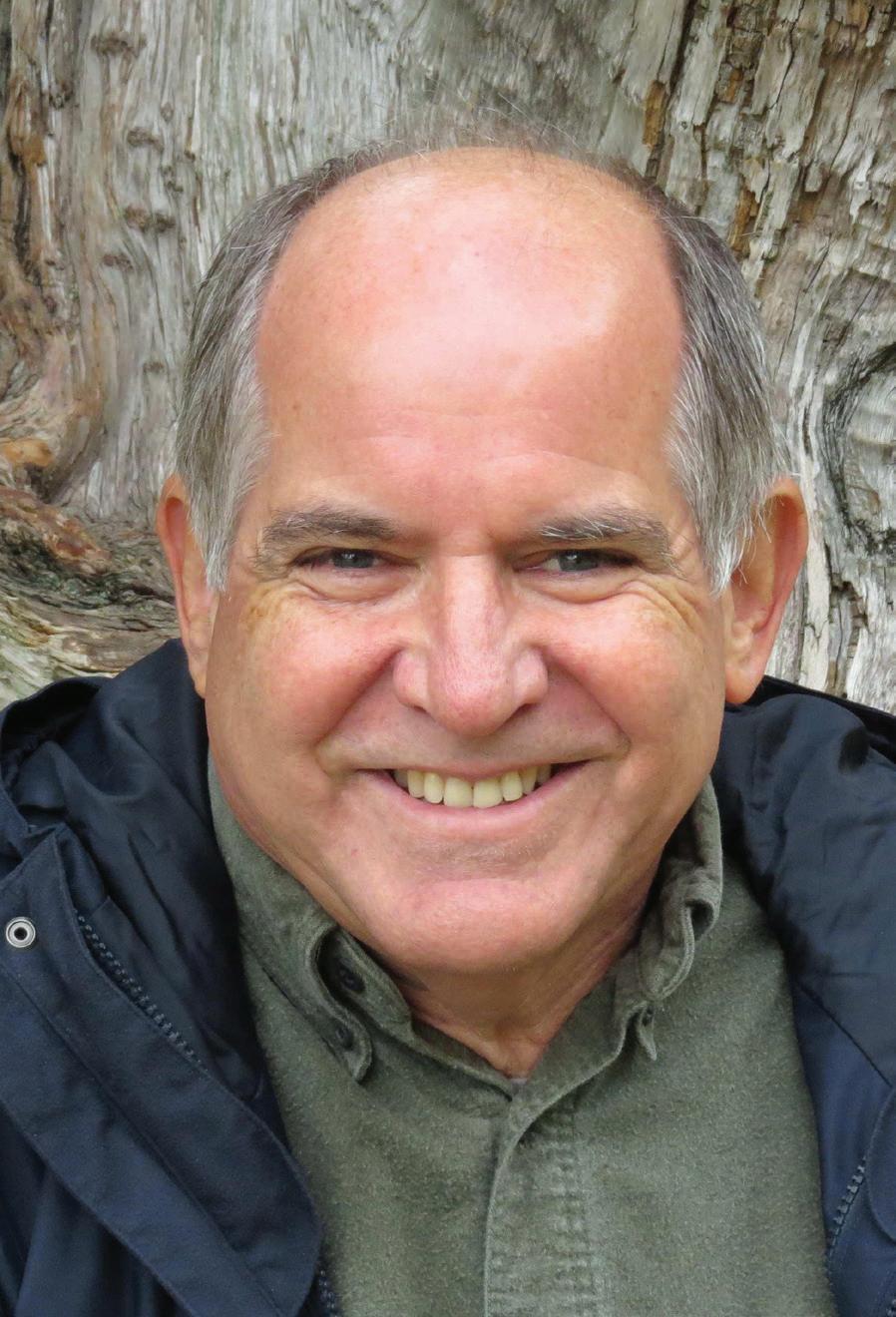
And yet, neither part lacks in excitement: because a bicycle isn’t a car, Goodrich had a vantage point that’s unique in travelogues, which is at least partly what this book is. Readers will find descriptions of bicycling and scenery, yet it doesn’t distract from history, which is the reason behind the ride. The nimbleness of the transportation mode helps Goodrich share the smallest, bravest, most impactfully historic tales of danger, determination and daring.
“On Freedom Road” is not filled with the tales you learned in school; no, it recounts the wild and violent and heroic, told between gentle accounts of weather, traffic and flat tires. Readers who are looking for something unusual will find that to be a nice balance.
“On Freedom Road: Bicycle Explorations and Reckonings on the Underground Railroad” by David Goodrich. c. 2023, Pegasus $27.95 246 pages.

THE POST, February 15 - 21, 2023, Page 5 postnewsgroup.com
Elmer Fonza, right, speaks during public comment at the California Reparations Task Force Meeting in Los Angeles on Sept. 23, 2022. Fonza and his brother Medford, seated on the left, want to know if a proposed Freedmen’s Bureau could help them file a claim in regard to property once owned in Gold County by their formerly enslaved great-great-great grandfather. Photo by Antonio Ray Harvey.
Simon Burris: *Africana Diaspora 2 Black History Month Crossword 2023 Ashe - Meghan www.simonburris700.com 1 2 3 4 5 6 7 8 9 10 11 12 13 14 15 16 17 18 19 20 21 22 23 24 25 26 27 28 29 30 31 32 33 34 35 36 37 38 39 40 41 42 43 Across 1 *Tennis champion Arthur 5 *___ Markle, American Duchess of Sussex 11 _ _ _ _ ipop (candy) 12 Revokes, in law 13 Create __ me a clean heart (Psalm 51:10) 14 *Marvin ___, singer 16 *_ _ _ sey Russell or Hussle, for short 17 *U.S. Secretary of State Powell (2001-2005) 18 Abbr. for right side 19 *Vice President Kamala 21 York Teachers Assn (abbr.) 23 _ _ Pollo Loco 24 *Original "Juneteenth" state; _ _ xas 25 *Tuskegee Airmen, briefly 27 *"I _ _ Legend" Will Smith film (2007) 28 Ent _ _ _ rise (venture) 30 Hair dressing 32 Illin _ _ s 33 *Jazz Hall of Fame singer Vaughan 34 Relaxing getaway 35 * Slave rebellion leader Nat _ _ _ _ er 36 *Los Angeles mayor Bass' initials 38 *Washington with two Oscars 40 *"Mood Indigo" bandleader Ellington 42 Trios, bands, etc. 43 *Verdi opera setting in Egypt Down 1 *Boxing legend Muhammad 2 *Richard Wright's classic "Native ___" 3 Heavy load (abbr.) 4 Ansel ___; "West Side Story" actor (2021) 5 __ __ Mother's Day month (2 wds.) 6 Heaven on earth 7 *Geor _ _ Washington Carver; agricultural scientist & peanut butter inventor 8 *___ Sampson; cell phone inventor, 1972 9 *1839 slave mutiny ship (movie 1997) 10 I _ _ _ect (examine) 15 "It's a sin to tell __ __ " (2 wds.) 17 *Initals for comedian/actor Rock 19 ___ haw! 20 *NBC's weatherman (2 wds.)) 22 *_ _ _ Zion Church 25 Torrance (city) (abbr.) 26 *___ Gorman; President Biden's Inaugural poet 29 *Alicia Keys' instrument 30 * Dunbar, Robeson, Chris & others 31 "Just say ___" (dentist) 33 *_ _ _ _ in Fetchit; first Black actor to earn $1 million (1925-1976) 34 South Dakota Gov, briefly 36 Kenya/Kuwait/Denmark (United Nations trio) (initials) 37 Girl's nickname 39 *Native South African; _ _ lu 41 *Joe Lo _ _ s: The Brown Bomber boxer
Author David Goodrich. Photo by Concetta Goodrich.
THE POST, February 15 - 21, 2023, Page 7 postnewsgroup.com Public Notices, Classifieds & Business To place a Legal Ad contact Tonya Peacock: Phone: (510) 272-4755 Fax: (510) 743-4178 Email: tonya_peacock@dailyjournal.com All other classifieds contact the POST: Phone (510) 287-8200 Fax (510) 287-8247 Email: ads@postnewsgroup.com THE POST PUBLISHED EVERY WEDNESDAY 360 14th Street, Suite B05, Oakland, CA 94612 TEL: (510) 287-8200 FAX:: (510) 287-8247 info@postnewsgroup.com www.postnewsgroup.net Paul Cobb - Publisher Brenda Hudson - Business Manager Wanda Ravernell - Sr. Assoc. Editor Ken Epstein — Writer and Editor Maxine Ussery - COO Jack Naidu - Production Manager Conway Jones - Editor, Capitol Post Photographers: Zack Haber, Amir Sonjhai, Auintard Henderson Contributors: Zack Haber, Tanya Dennis, Kiki, Godfrey News Service, Robert Arnold Distribution: A and S Delivery Service abradleyms72@gmail.com (415) 559-2623 Godfrey News Service eelyerfdog@juno.com (510) 610-5651 This newspaper was incorporated on June 8, 1963. It is published by The GOODNEWS Is..., LLC, 405 14th Street, Suite 1215, Oakland, CA 94612. The contents of the POST Newspapers are copyrighted and may not be reproduced in any form without the advance written consent of the
Lawmakers Push Bill...
Continued from page 2
people have died so that we can exercise that privilege, that is an affront against those who have suffered ill, and a lot of times eternal pain,” Lackey said.
Responding to Lackey’s objection, Bryan said, “That’s like saying allowing incarcerated persons to breathe is an affront to their victims, allowing incarcerated persons to drink water, allowing incarcerated persons to hold conversations with one another.”
“There is no reason that that should be coupled with disenfranchisement and the expelling of individuals as citizens of this country.”
“There’s a difference between suspending a privilege and dehumanizing someone,” Lackey said. “Certainly no one expects someone to go through inappropriate suffering. That is not part of justice. That’s not part of our judicial process.”
David Liamsi Cruz, an advocate from Initiate Justice, was released in September after serving 13 years in prison.
“One problem that I constantly came across was that people serving their sentences alongside me felt that they didn’t have the means to improve their environment that controlled their lives or to con-
tribute to their families’ wellness outside. Despite what many people assume, people in prison care about the same political issues that we outside do,” Cruz said.
“Those who were willing to become civically engaged with me were diligent in their work, they even brought me bill ideas that could have solved issues that were longstanding in their communities. I was honored to witness their passion for change, for an opportunity to grow, and to contribute to something way bigger than themselves. Even though I am home [from] prison now, I have not forgotten the ten thousand voices of people who are still inside and have so much to contribute. I want their voices to be heard.”
Supporters of the plan say that reducing recidivism — or the reincarceration of persons less than three years after they are released from prison — is one of the primary benefits of this plan.
“We already know a lot of the facts, and the facts are that the more someone is engaged in their democracy, they are 50% less likely to reoffend,” said Assemblymember Ash Kalra (D-San Jose) who is a co-sponsor of the bill.
“So, if we already know this, then the policy not allowing those
who are incarcerated to vote has nothing to do with public safety.”
Kalra said when he was a public defender it was “plain as day” to see who was given second chances.
“Those who were given probation versus prison, and it was so connected to race and class and the same communities who have been fighting to be free since the inception, and before the inception of this nation,” he said.
Another concern is the ability for those who are incarcerated to hold public officials accountable.
“Those who are incarcerated and their families are some of the most educated people in our state, far more educated than the average voter,” said Kalra. “And they will hold us accountable, and maybe that’s what people are afraid of. They don’t want that accountability from those who are suffering the most from decisions that are made traditionally in [the Capital].”
The legislation is backed by a coalition of lawmakers, including California Legislative Black Caucus members — Assemblymembers Lori Wilson (D–Suisun City), Reggie Jones-Sawyer (D-Los Angeles), Tina McKinnor (D–Inglewood), Mia Bonta (D-Oakland), Dr. Akilah Weber (D–San Diego) and Senators Steven Bradford (DInglewood) and Lola Smallwood Cuevas (D–Ladera Heights).
“There was a time where women couldn’t vote,” Jones-Sawyer said at the press conference held last week to announce the bill. “There was a time when African Americans couldn’t vote, and just recently we tried to get slavery out of the California state constitution and it failed, because of Democrats.”
“An American citizen’s right to vote is the most powerful right in our nation,” McKinnor said.
“Let’s be clear, an incarcerated American citizen is an American citizen, and no law should ever restrict an American citizen’s right to vote. Too many Americans have died, too many Americans have sacrificed, too many Americans have been denied the right to vote for too long.”
Lackey and others who oppose the legislation, however, insist that denying a felon to vote is appropriate punishment.
“There has to be a period of reflection and a period of suspension of certain what I would call privileges or rights in order for the judicial process to be effective,” Lackey said to CBM.
Bryan said the protection of citizens’ rights is paramount.
“There are some basic human rights, and then there are some basic American rights that have to be preserved, even in the systems of accountability,” he emphasized.
Spending by Water Utilities...
Continued from page 3
tunity for successful business partnership. These events encourage a deeper understanding and sharing of mutual goals and objectives that go beyond the singular opportunity for contract award.
The Supplier Diversity Program, which I have the honor of running for Liberty Utilities, helps us strengthen the utility supply chain, grow and develop diverse supplier partnerships, and enhance and positively impact the communities that we serve.
I can stand confidently in the knowledge that we are positively and greatly influencing the diverse supplier marketplace and the economies in which they reside.
These achievements benefit everyone – the utilities, small businesses, and the communities they serve. Over one-third of customers served by California’s regulated water utilities live in underserved communities, and the areas served need innovative investments in water infrastructure to prepare for challenges that climate change present to the future of water resilience in California.
Our investments in supplier diversity enhance customer confidence and satisfaction and represent a high-value use of the dollars spent on capital investment. Water
utilities’ services and projects succeed when the professionals doing the work know, understand, and reflect the people in the communities served.
Regulated water utilities use customer-funded dollars to leverage larger investments back into repairs and maintenance of existing infrastructure and capitalize on the latest innovations in their local water infrastructure projects. The strength of our investments depends on important financing decisions made by the CPUC to attract the necessary funding to make these infrastructure investments.
Supporting local firms with the right expertise, workforce, competitive prices, and community understanding is one way that water utilities provide benefits to the customers who help generate the funding and the businesses at work in their neighborhoods.
I look forward to working with more Black-owned businesses and other diverse suppliers in the years ahead to continue diversifying Liberty’s supplier community and supporting the CPUC’s continued incentivizing of diverse investment that benefits all of us and our communities.
Holley Joy is the Supplier Diversity Program Manager for Liberty Utilities.
postnewsgroup.com THE POST, February 15 - 21, 2023, Page 8
Linda Hudson Endorsed for Alderman of Chicago’s 8th Ward by Post News Group
 By Post Staff
By Post Staff
Local elections are February 28 in Chicago, the third-largest city in the country with a nearly 30% Black population. The city’s South and West sides, once marked by thriving and vibrant Black neighborhoods, now struggle with widespread disinvestment and other issues.
One candidate running to make a change in the Eighth Ward is Linda Hudson, a longtime community organizer who has been endorsed by the Chicago Tribune. We talked to Hudson about why she’s running and what she hopes to accomplish if elected. Their interview has been edited for brevity.
Oakland Post: Why are you running?
Linda Hudson: [My family] moved to Calumet Heights in 1969. It was beautiful. There was homeownership and a sense of community. We had Black professionals and a working class. We had strong Black elected leaders.
I’m not sure exactly what happened, but I’m running because I don’t recognize my community. Our business corridors are filled with boarded up businesses. We’ve got tons of vacant and boarded up homes. There’s been an uptick in crime. There are many seniors in the community. I’m hearing over and over, “We feel like we’re under siege.” We don’t have a lot of programs for our youth. So, I’m running because I just don’t recognize the community that raised me and I want to bring it back to its glory. I want to bring professionalism back to the Eighth Ward office.
OP: What are your three biggest priorities?
LH: My top priority is safety. I want more police presence. I think we should know our police officers by name. There’s a shortage of officers and they are moved to downtown to protect that area. And the ones in the community are moved around to other areas of the city. If police officers could give our community two years without being transferred, that could be great for building community relationships.
Economic development is another issue. We don’t have decent
Crumble and Whisk Patisserie, a Black-Owned Bakery and Café, Opens in Laurel District
businesses in the ward. We don’t have a nice sit-down restaurant. We don’t have healthy options. There needs to be a marketing strategy to bring business in and make sure businesses can thrive in this environment.
Stony Island is going to be the gateway to the Obama Center. And right now, there’s nothing for people traveling down this gateway. When I go out of town, I want to go to that restaurant or that store that I heard about. But this area has nothing for a visitor coming in.
The third thing is more activities for our youth. Many of our young people are opting out of college, so we need to put trades back into the school. We need more mentoring, and more activities.
OP: Why you instead of the incumbent?
LH: Because I have a vision. The incumbent does not. She was appointed and has been in office for 16 years. And, there has been a drastic decline in the community in the last 16 years. There’s no clear vision. We have the Regal Theater on 79th Street that has landmark status and this administration has done nothing to help renovate and restore it to its past grandeur with the many grants that are available through city programs.
And right across the street from the Regal is a coffee shop that was built with millions of dollars but never opened. I see 79th Street being our arts district. I see more viable business in our business district – trying to help small entrepreneurs grow their businesses. I’ve talked to people and they want to be in this community. But they must go through the alderman’s office and the incumbent makes it very difficult.
We’re an older ward and older people are going to leave. The only way to attract younger people is to have activities. Young people like to go out. A bowling alley or movie theater. We’ve got to be able to grow this area. And I have the vision and the professionals willing to assist in the effort.
I will be the alderwoman for the entire ward, not just those residents that go along with the incumbent’s program.
Proposal Writing Workshops...
Continued from page 2
to individual donors. This capacity-building training is designed to help faiths and nonprofit leaders build those critical skills,” Bogan said.
Clearly, accomplishing that will require financial and other resources. Grantors want to partner with impactful organizations that can present the most compelling case for funding.
This popular, free, interactive training is designed to teach powerful proposal-writing techniques to individuals with little or no prior experience or those needing to polish their skills. Participants will learn:
Why funders fund
Understanding the array of grant makers
• How program design, needs
Crumble and Whisk Patisserie, a Black-Owned Bakery and Café, Opens in Laurel District
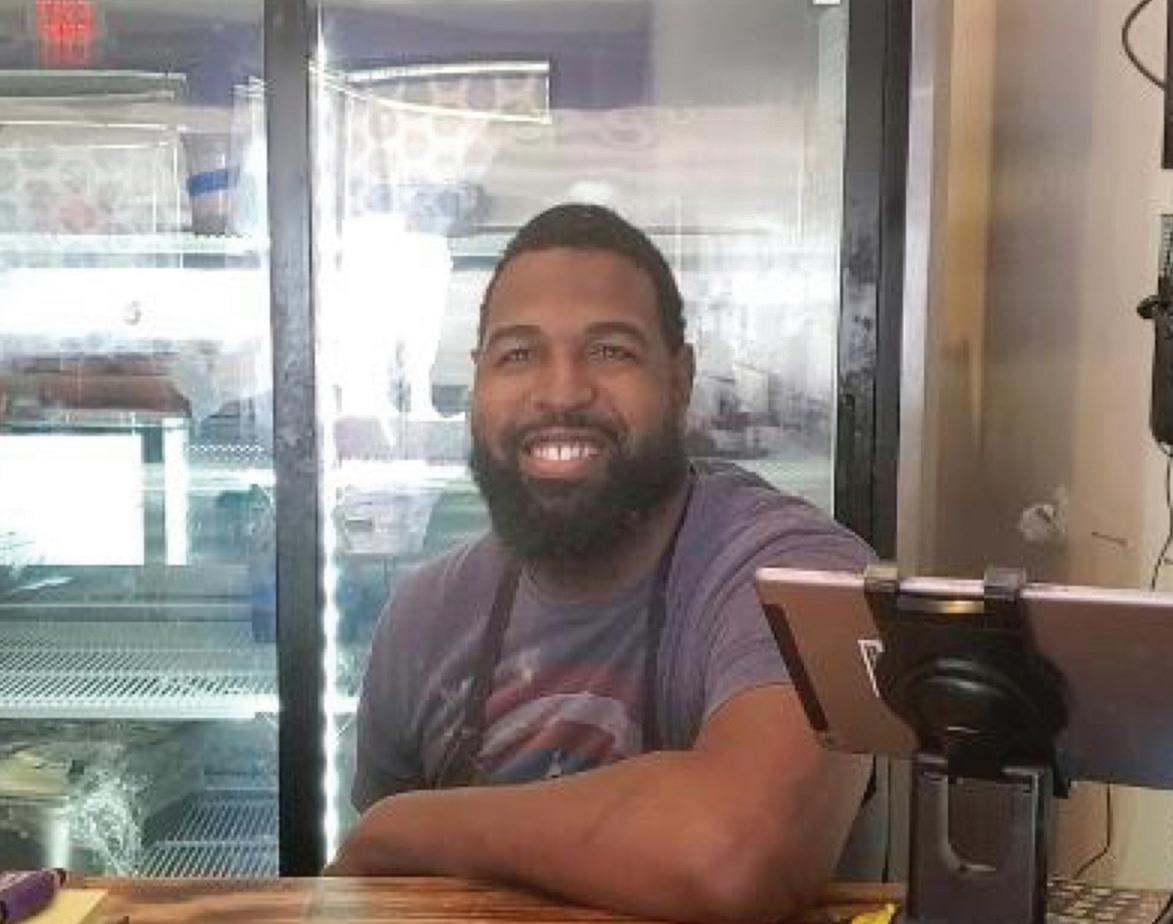 By Carla Thomas
By Carla Thomas
A new Black-owned business, Crumble and Whisk Patisserie, opened in December near the corner of 39th and MacArthur in East Oakland.
With its colorfully painted exterior, the cafe along the Laurel district’s popular corridor on MacArthur Boulevard is an artistic addition to the neighborhood.
The shop’s desserts are just as aesthetically pleasing, featuring signature cheesecakes in a variety of flavors. From lemon to berry to chocolate, patrons have a variety of treats to choose from including,

cArthur,” said Farrier.
As the seasons change, so does the café’s menu. With Valentine’s Day around the corner, Farrier’s offerings will include a red wine raspberry cheesecake and roasted sweet potato and bourbon cheesecake. With such a wide range of choices, the cheesecake box is sure to satisfy any sweet tooth.
“Our cheesecake boxes feature four different mini cheesecakes,” he said. “We’re accepting pre-orders now.”
Like so many businesses that closed during the pandemic, Crumble and Whisk felt the impact
By Zoe Jung Post News Group Intern
Flooding was a surprise for Bay Area residents this winter.

The cold, wind, and recordbreaking precipitation hit the Bay Area from late December to midJanuary.
On New Year’s Eve, Oakland broke its record for single-day rainfall by just one-hundredth of an inch.
It was all disastrous: sewers and rivers overflowed; trees fell on homes and streets, killing several people; and a 10-foot sinkhole opened under the road to the Oakland Zoo, forcing a month-long closure.
Lake Merritt nearly overflowed its banks, while flooding in San Francisco’s Mission District destroyed houses and businesses, causing tens of thousands of dollars in damages.
On January 4, PG&E reported almost 100,000 Bay Area homes had lost power.
atmospheric rivers passed almost consecutively over California since late December. They’re ranked on a 1 to 5 intensity scale based on volume and duration.
The Center for Western Weather and Water Extremes reports that five of the nine storms were ranked as Level 3, “strong,” or higher.
Atmospheric rivers are a key part of global water interactions. Most are weak and only cause light rain, but the powerful ones can be extremely dangerous—especially in groups.
The National Oceanic and Atmospheric Administration (NOAA) says that on average, between 30%-50% of annual precipitation on the West Coast is caused by “a few” atmospheric river events. In California, they make up over half the annual precipitation.
These storms don’t seem to be directly caused by climate change, according to the Los Angeles Times, but they’re a destructive reminder of its threats.
savory pot pies and hot cinnamon buns.
Owned and operated by popular chef Charles Farrier, who has garnered a huge following at Bay Area farmers’ markets, the location speaks to Farrier’s roots as a native of Oakland.
Farrier said it was important to open a business in the community and a place where he grew up. Inspired by his father who cooked meals for the family, Farrier knew he always wanted cooking to be a big part of his future, but an unconventional path led him to where he is today.
At his corporate job, Farrier was challenged to bring dessert. His homemade cheesecake was such a hit with his co-workers that a colleague proposed a challenge: With every slice of his bourbonvanilla cheesecake sold, Farrier had to consider taking his talents to the next level.
“Every slice sold for $2.75,” said Farrier.
when its lucrative catering business slowed down.
“We lost so many accounts. During the pandemic we had to pivot the business and that’s when we started offering cinnamon rolls, cookies, brownies, and chicken pot pies,” he said.
While readapting his catering business to fit the cafe business model, Farrier transformed menu items from frittatas to quiche; made house made turkey patties the star of breakfast sandwiches, and even added a Japanese-style egg salad sandwich.

Farrier has also utilized LaCocina’s small business incubator, which, according to their website, has the mission to “cultivate lowincome food entrepreneurs as they formalize and grow their businesses.”
“LaCocina has really been an advocate and helped us sustain our success,” said Farrier.
The same day, Gov. Gavin Newsom declared a state of emergency across California. State agencies provided aid and supplies like sandbags to local governments; the California National Guard was deployed on rescue missions, clear debris, and divert mudslides.
The National Weather Service for the Bay Area reported 18.33 inches of rainfall in Oakland and 15.28” at the SFO Airport, breaking their records for rainfall depth over a three-week period.
This crisis was caused by atmospheric rivers: long, dense streams of water vapor that flow North and South at high altitudes from the tropics, bringing rain and snow when they move over land.
Newsom reported that nine
Californians can expect more storms like these, and the potential magnitude of their impact is clear: all of California was updated to mild drought at most following the storms, including parts of the state that the Federal Drought Register previously classified as “extreme” or “exceptional” drought.
But these improvements came with a high cost: widespread disaster and multiple deaths.
But if the pattern swings back the other way, it could cripple California’s water resources—and it’s this increasing variability that is expected as climate change persists.
Every increase in global temperature increases the amount of moisture the air can hold, multiplying the potential strength of atmospheric rivers.
Celebrate Black History with Bonita The Bumble Bee!
assessment, and evaluation connect to fundability
• How to craft your organization’s master proposal
• Tips for getting funders to yes
— by reviewing your own proposal from the grantors’ perspective
• Why funding research is essential to identifying likely funding partners
This training is recommended for individuals new to writing proposals, as well as those who want to polish their grant writing skills. We hope to see you there!
Date: Feb. 23, 2023
Time: 9 a.m. – 11 a.m. PST
Location: Virtual training, Zoom Meeting ID: 861 4945 3331
To Register for the event, visit: AModelBuiltOnFaith.org
Partnering with a paralegal friend with financial knowledge, Farrier was able to focus on developing the company concept and menu. From the San Francisco Farmers’ Market at the Ferry Building to Livermore Farmers’ Market, Farrier gained traction, but it was his hometown that initially supported him. “I started off by selling to the barbershops and small businesses right here on Ma-
Farrier finds it a privilege to follow his passion in not just baking, but community building. “Food brings the community together, families together, and it’s so universal. I’m glad to have a shop right where it all began,” he says.
Farrier’s message to aspiring entrepreneurs is simply, “Strive for your dreams, but do your research so you save time and money.”
For more information visit: CrumbleAndWhisk.com
By Tarsha Jordan
Bonita The Bumble Bee’s S.T.E.A.M. Fair
Teacher
celebration for children preschool age through 2nd grade.
The free event will be held on Saturday, Feb. 25, 2023, from 10 a.m. until 3 p.m. at the G.O. James and Rosa James Family Life Center on the Beth Eden Baptist Church campus at 1183 10th St. in Oakland.
Organizers hope to spark interest in S.T.E.A.M. for young children and their families. This event will include interactive activities, presentations, awesome learning opportunities and appearances by Bonita the Bumble Bee!
“Come buzz with us!” Jorna says. “We hope to see you there!”

postnewsgroup.com THE POST, February 15 - 21, 2023, Page 9
Chef Charles Farrier, owner of the Laurel District’s new Crumble and Whisk Patisserie at 4104 MacArthur Blvd. in East Oakland.
Warning signs like this one in Donoma County were distributed in many California communities as storm waters surged at the turn of the year. iStock photo.
Menu on wall at Crumble and Whisk Patisserie at 4104 MacArthur Blvd. in the Laurel District of East Oakland.
Menu options at counter of Crumble and Whisk Patisserie at 4104 MacArthur Blvd. in the Laurel District of East Oakland.
celebrates Black History!
Tarsha Jordan, career educator, creator of Bonita the Bumble Bee and author of Bonita The Bumble Bee books is presenting a Black history
Though Thousands of Miles Away, Tyre Nichols’ Death Affected Oaklanders
Oakland alone in the past decade, over 60% of those being Black people. (http://www.antievictionmappingproject.net/opd.html)
Due to this there have been many events in Oakland in response to Nichol’s death.
On January 29, there was a protest in downtown Oakland organized by the Anti Police-Terror Project. On February 6, there was a rally at Oakland Technical High School led by Youth Vs Apocalypse and CURJ.
Other organizations in Oakland are doing similar things such as the Anti Police Terror Project (ATPT) and the Love Not Blood Campaign.
George Galvis is the executive director of CURYJ, an Oakland nonprofit promoting youth leadership. Photo courtesy of George Galvin.
By Daisha Williams
Post News Group Intern
Like many other cities nationwide, Oakland was heavily impacted by Tyre Nichols’ death on January 10 in Memphis, Tenn., three days after being brutally beaten by multiple police officers.
The officers allegedly pulled Nichols over for reckless driving. What followed was revealed on January 27 when the footage of the body cameras that the officers were wearing was released.
The officers first verbally degraded Nichols, who remained calm and respectful. The officers involved originally claimed that Nichols had attempted to run from them; the footage shows this to be false.
Five police officers were charged with Nichols’ murder on January 26. All five of those officers were Black men. One other officer was fired days later, and several more are under investigation.
The Memphis Fire Department also dismissed a lieutenant, and two Emergency Medical Technicians who had been at the scene lost their jobs for failure to administer aid to Nichols.
Oakland has always been an epicenter for social justice and advocacy.
George Galvis is the execu-
tive director and co-founder of CURYJ, pronounced “courage,” which stands for Communities United for Restorative Youth Justice.
In response to a question about how the Nichols case affects Oakland communities, he responded “I think it’s important to think that there are many Tyre Nichols’ and while in this particular moment there is righteous outrage, as there should be for the blatant and egregious murder of a young Black man for a fraudulent traffic stop, we have many, many cases here in the Bay Area that we perhaps have more agency over as Oaklanders.”
Galvis also talked about the reputation the Bay Area, and California as a whole has. Although it is liberal in comparison to other places, many people assume that oppression doesn’t exist here.
Nichols’ death reminds Oaklanders of its distant and recent history with police terror and brutality.
In 1966, the Black Panthers were founded here, and one of the main things they fought against was police brutality.
In 2009, Oscar Grant was shot by a BART officer at Fruitvale Station. A BART ride away, multiple San Francisco Police officers shot Mario Woods 41 times in 2015.
Police have killed 64 people in
In an interview about legislation to make police accountable, Cephus “Uncle Bobby” Johnson, the director of the Love Not Blood Campaign, told California Black Media “What happened to Tyre impacted so many in California. It re-traumatized many of the families,” said Johnson. “Many families’ wounds have been reopened. Many families’ hopes that there has been some progress have been totally erased,” continued Johnson.
In hopes of preventing members of the community from hurting more than necessary, the Love Not Blood campaign sent out a letter when the footage of Nichols’ beating was released.
The letter said, “The video of Tyre Nichols is horrific so think in advance about how you may begin to feel, and your thoughts, and make sure that you honor those thoughts and take the steps to cope with the trauma.
“If you do decide to watch the video or consistently listen to the news of Tyre Nichols’ murder be sure to not be alone when watching or listening consistently.”
If you would like to be more involved in Oakland’s fight against police brutality, you can find more information on the websites of any of the organizations mentioned: https://curyj.org/ https://lovenotbloodcampaign. com/ https://www.antipoliceterrorproject.org/
Mashudu Tshifularo: The First Middle-Ear Transplant
known cure, treatment, or surgical procedure for deafness worldwide.
COMMENTARY: Struggling to Be Safe When People Want to Ignore COVID; and Feinstein’s Impact on Barbara Lee
2,100 deaths.
The news broke as I was filing. Sen. Dianne Feinstein has decided to retire at the end of her term a year from now in 2024.
It’s a decision with historical significance, as it could keep Rep. Barbara Lee of Oakland from being only the third African American woman in the 232-year history of the U.S. Senate.
Currently, there are no African American women in the Senate.
Had Feinstein said she would retire immediately, the vacancy would have to be filled. And Gov. Gavin Newsom had already said he was ready to appoint an African American woman. Barbara Lee was on the short list.
That would have given Lee a leg up on Democrats like Rep. Adam Schiff and Rep. Katie Porter, both of whom have already raised big money to take Feinstein’s seat.
But now Feinstein in a statement says she’ll go “through the end of next year, when my term ends.”
Will Lee even consider a run now in a crowded field without the advantage of a short incumbency?
Unless big donors come her way, Feinstein’s decision may have shut the door on Lee.
COVID and My Off-Broadway Appearances
I’m officially coming out of hiding. I’m in New York City doing two Off-Broadway theater projects. The first is my own live, one-man show at Under St. Marks Theater, Feb. 16-March 4.
The other, is a small part in a satirical play by Oakland resident Ishmael Reed, “The Conductor.” Get ticket info at: https://ci.ovationtix. com/35441/production/1149771
It’s been three years since I’ve done anything live on a stage, all due to the pandemic.
If you do come, I’ll be the guy
in the mask. Not just the masks of tragedy and comedy, but of COVID.
I’ll take it off on stage, of course, but I hope you’ll wear one, too.
You do know the pandemic isn’t over, right?
And that is really the subject of this column.
I was flying over the weekend, but well below 60,000 feet. So, I was an identified flying object. I was just masked. Shouldn’t we all be?
On the plane were some people wearing masks. But not the majority.
In my row, I sat next to two youngish Asian Americans, one a South Asian guy, the other a Chinese girl. Forget about how none of us spoke a word to each other during a nearly five-hour flight. They had air buds on and were in their own digital worlds. That I don’t mind.
But here we are in a flying metal tube, in close proximity to each other, negating whatever filter system is in use. And neither of my row mates are masked.
I’m masked the whole time, even during the pretzel eating, because I’m courteously protecting others from whatever germs I have.
Are they thinking of me? And why aren’t they?
What happened to that notion of Asian respect for older generations?
According to the New York Times, three-quarters of COVID deaths have occurred in people over 65. That was true during the height of the pandemic and remains true to date, with the most deaths in people over 75.
But break down the death numbers for January and you’ll see how scary real COVID is for older people.
For those 65 to 74, there were
For those 75 to 84, there were 3,500 deaths.
For those over 85, there were close to 5,000 deaths.
That’s about 90% of the COVID deaths in January.
Counting deaths may seem macabre, but it tells you something about who is the most vulnerable, and whom we should care about.
Instead, there’s actually a debate over whether there should there be any responsibility to fellow members of society when it comes to COVID. That’s debatable? Are we throwing people off the life raft?
And let’s not be ageist: what about the immunosuppressed and others with chronic illness? Who cares about those still at risk?
The government is planning to remove the national emergency and public health declarations related to the COVID-19 on May 11.
Too soon? After the January we had, it’s really fingers crossed.
Public health is becoming a DIY matter. Do it yourself if you want a sense of it. And then you know which groups will be hurt the most. People of color, those without means. Same old, same old.
If you want to show a public responsibility to others, great. You’re a saint. But after three years of COVID restrictions, it seems most of us don’t want to think about it anymore. We want to live our lives and take the risk.
Me? I’m finally going back out. But I’ll be thinking of you and wearing my mask. Except when I’m on stage doing “Emil Amok: Lost NPR Host Found Under St. Marks.”
Emil Guillermo is a journalist, commentator, and sometime live theater performer. See him at www.amok.com.
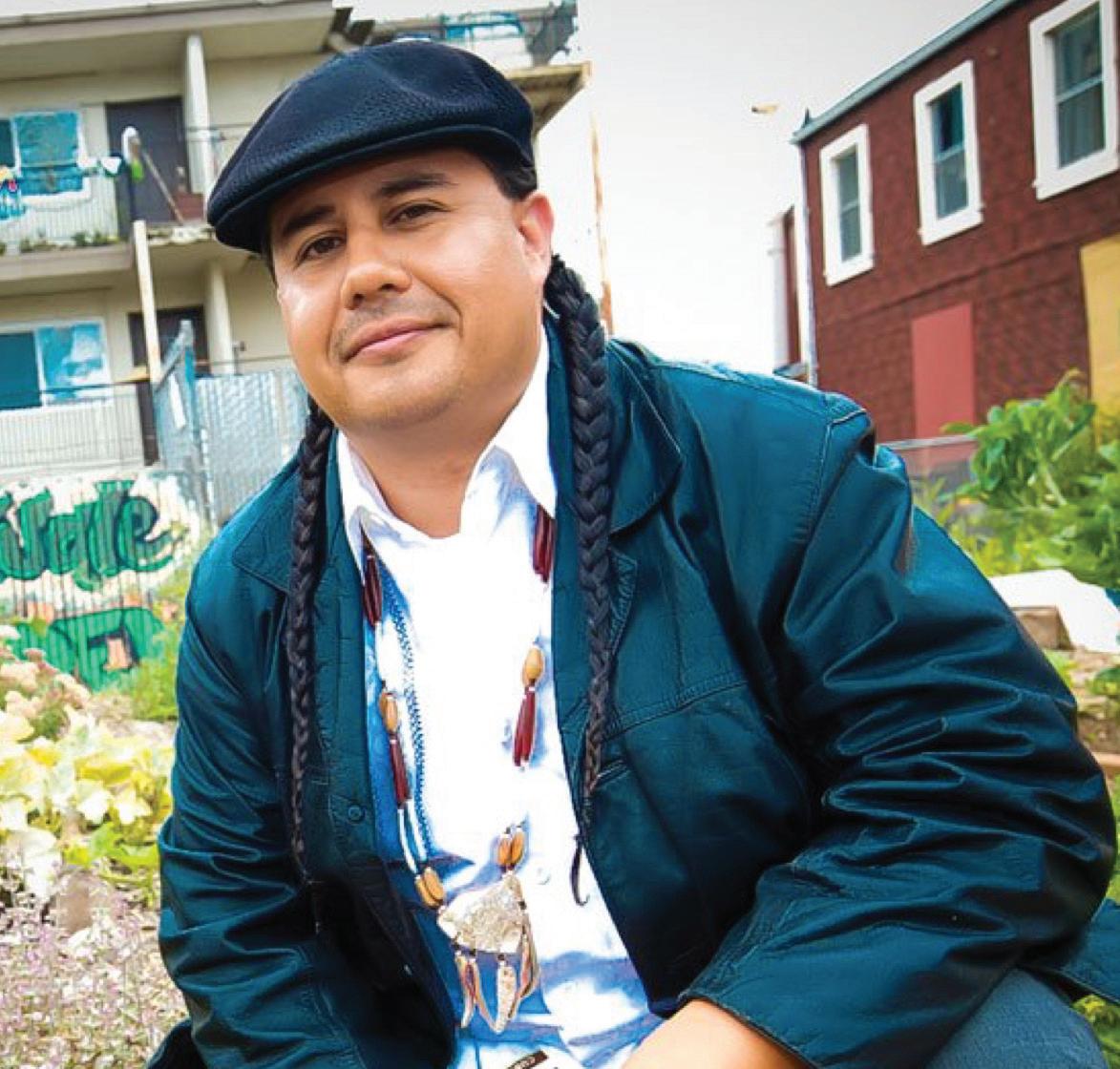
A team of surgeons led by Dr. Mashudu Tshifularo, using 3D technology, successfully pioneered the transplant of a patient’s middle ear to cure his deafness.
 By Tamara Shiloh
By Tamara Shiloh
For nearly 430 million globally, hearing loss is a disability. It is expected that by 2050, this num-
ber could rise to more than 700 million, according to the World Health Organization.
Prior to 2019, there was no
On March 13 of that year, a team of surgeons led by Dr. Mashudu Tshifularo (1964–) using 3D technology, successfully pioneered the transplant of a patient’s middle ear to cure his deafness. The team was from the University of Pretoria Faculty of Health at the Steve Biko Academic hospital in Pretoria, South Africa.
The patient, a 35-year-old man, suffered hearing loss after a car accident caused his inner ear what was thought to have been permanent damage. Tshifularo recreated the bones that make up the inner
1111 Broadway, Suite 800, Oakland, CA 94607 (510) 208-7400 • www.alamedactc.org
Request for Proposals (RFP)

forMunicipal Advisory Services (RFP No. R23-0010)
The Alameda County Transportation Commission (Alameda CTC) is seeking proposals for a contract to commence services on July 1, 2023, or as indicated in the RFP and/or appropriate addenda.

Key Dates:
• Pre-proposal conference will be held online: February 24, 2023 at 1:30 p.m. Pacific
Time (PT)
• Proposal due date: March 22, 2023 at 3:00 p.m. PT
Proposals are subject to Alameda CTC’s Local Business Contract Equity Program. The Program goals for professional services are 70% for Local Business Enterprise (LBE) and 30% for Small LBE. For Program requirements and forms, visit Alameda CTC’s website. Any contract resulting from this RFP will be awarded without discrimination based on race, color, religion, sex, sexual orientation or national origin.
All RFP documents are available at www.alamedactc.org/contracting-opportunities. All questions regarding this RFP must be submitted in writing to vvijil@alamedactc.org, no later than 3:00 p.m. PT on March 1, 2023.
Submittals must be made in accordance with the instructions in the RFP. Any contract awarded must be in compliance with the local, state, and/or federal requirements.
ear, replacing the damaged ones. The one-and-a-half-hour surgery, performed through endoscopy, was the first-ever transplant of the middle ear that allowed a deaf man to hear.
During Tshifularo’s first doctorate studies, he focused on conductive hearing loss and through this, came up with the idea of using 3D technology to recreate any of the inner ear bones that may be damaged, restoring a patient’s hearing. While studying at the University of Pretoria, he forayed into the use of 3D printing technology.
Today, 3D technology has proved to be extremely useful and needed in the medical industry.
“By replacing only the ossicles (three bones in either middle ear)
that aren’t functioning properly, the procedure carries significantly less risk than known prostheses and their associated surgical procedures,” Tshifularo told Radio Nigeria during a post-surgery interview. “The technique could be the cure for hearing defects irrespective of the patient’s age.”
Tshifularo added that the patient’s hearing will be restored immediately, “but since they will be wrapped in bandages, only after two weeks, when they are removed, will they be able to tell the difference.”
Tshifularo grew up as a herdsman in the rural village of Mbahela outside Thohoyandou, in Venda, South Africa. By age 13, he knew he would be a medical doctor. After attending the Mbilwi Second-
Grayson Creek is opening its waiting list for a limited time! This affordable apartment community in Pleasant Hill offers 70 units of 1, 2, & 3 bedroom apartments with rents from $595-$2,074. Applications for the waiting list will be available and accepted starting from 9am Tuesday, February 21, 2023 to 5pm Friday, March 31, 2023. Applications submitted by mail must be postmarked no later than 3/31/2023. Applications will be made available in 3 ways: 1) online at https://bridgehousing.com/properties/ grayson-creek/ or 2) calling the Grayson Creek office at (925) 686-4000, or 3) email at GraysonCreek@bridgehousing.com
ary School, he began training in medicine at the University of Natal. In 1990, he began working as a practicing physician at Tshilidzini Hospital and in 1995 became a professor and began heading the Department of Otorhinolaryngology (ear, nose and throat) at the University of Pretoria.
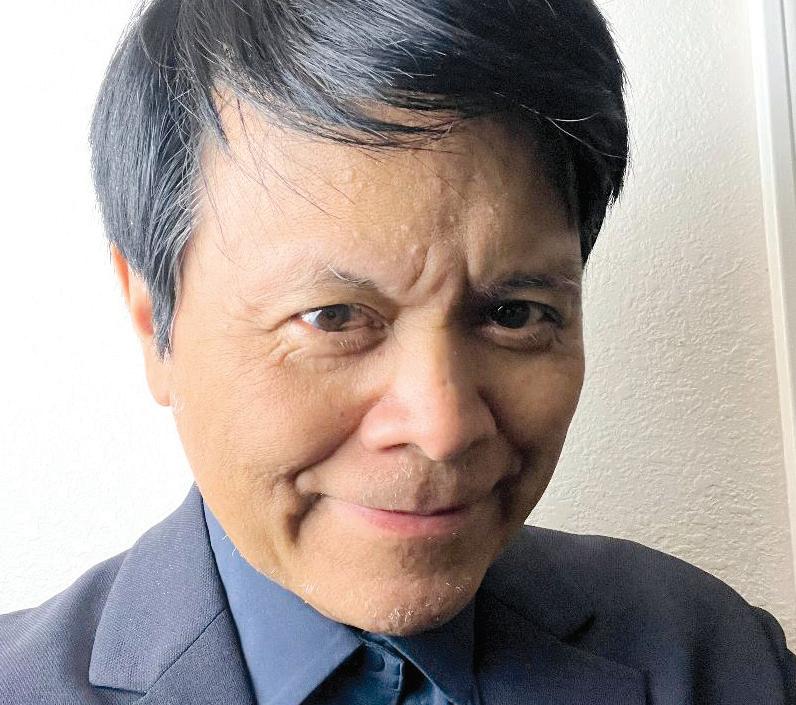
In 2000, he was appointed as the youngest and only Black professor of ENT in South Africa. Tshifularo is also the senior pastor and founder of the Christ Revealed Fellowship Church near Pretoria. He has also authored several books in this ministry.
“People like me never arrive,” Tshifularo said. “After climbing one mountain we want to climb another one. If I was easily satisfied, I would have never achieved all the breakthroughs in my life.”
Learn how three young men took their place among the 5% of Black U.S. doctors in “Pulse of Perseverance,” by Pierre Johnson, Maxime Madhere, and Joseph Semien.
CASH
FOR
postnewsgroup.com THE POST, February 15 - 21, 2023, Page 10
The office is located at 100 Chilpancingo Parkway in Pleasant Hill, and office hours are Mon-Fri 9am-5pm. Amenities include all electric kitchens, dishwashers, wall-towall carpets, patios/balconies, and assigned parking. For more info call 925-686-4000. Income and other restrictions apply. Section 8 welcome. EHO. OLD
45s & LPs
No collection too big or small. Call/Text (800) 916-0378 VgVinyl@gmail.com
R&B, Soul, Funk, Rap, Jazz, Blues, Local stuff, DJ Promos, etc.
By Emil Guillermo
postnewsgroup.com THE POST, February 15 - 21, 2023, Page 11 Stanford_Heart Month_12"x20.5"_Oakland Post.pdf 1 26/01/23 11:58 AM
Unapologetically Black Mayor of Bay View Hunters Point Charlie Walker Leaves SF Legacy
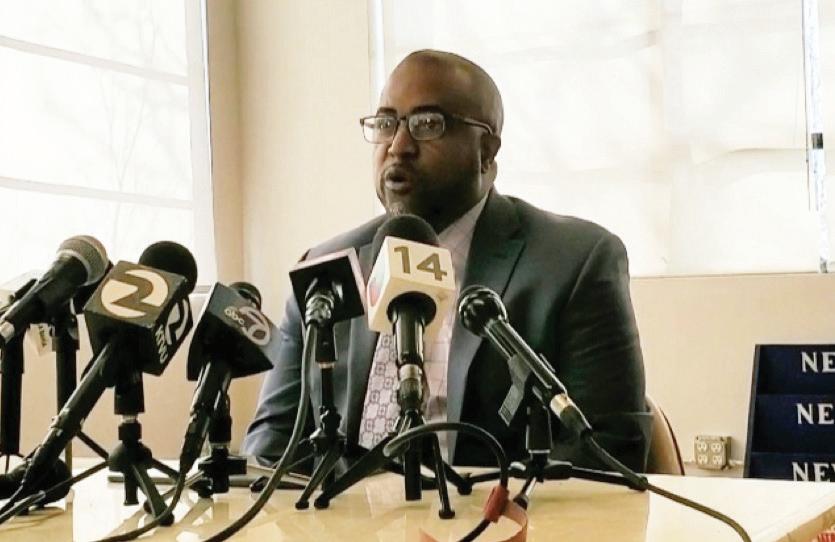
Walker’s granddaughter Geoffrea Morris read letters of acknowledgement from U.S. Vice President Kamala Harris, U.S. Congresswoman Barbara Lee, Gov. Gavin Newsom, Assemblymember Matt Haney and State Controller Malia Cohen.
A reading included Walker’s favorite poem entitled, “A Gentleman” written by Beverly Al-Kareem. Family member Crystal Walker sang “Trouble of the World.”
By Carla Thomas
A celebration of life for the mayor of Bay View Hunters Point, businessman Charlie Walker, was held on Friday, Feb. 10 at Third Street Baptist Church in San Francisco. Walker passed away just six months shy of his 90th birthday on Jan. 26.
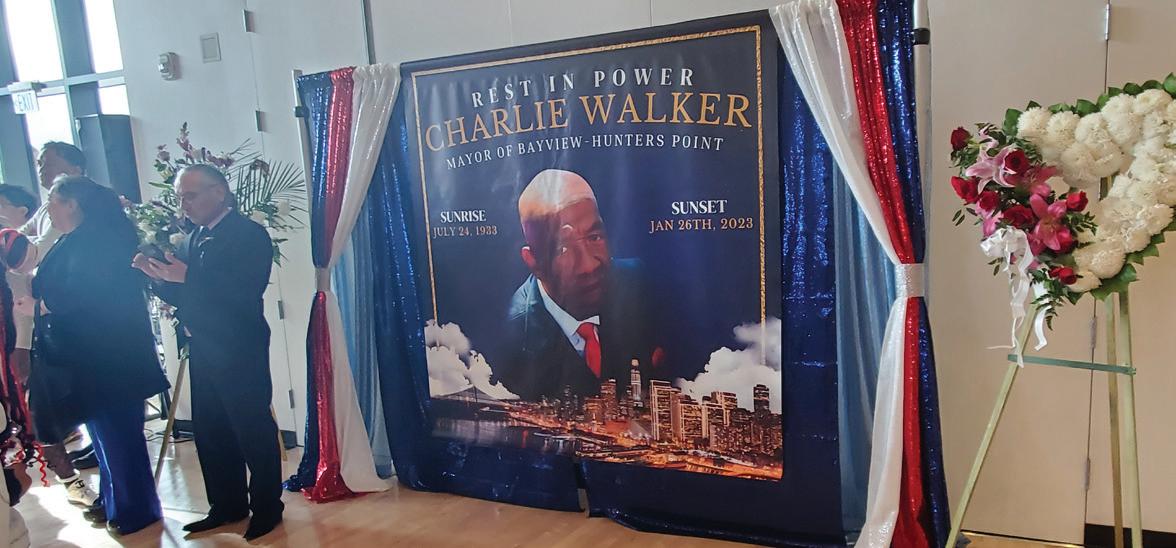
Born in the South, Walker relocated to San Francisco in his early teens and faked his birth certificate to join the Air Force, where he served for three years. He returned to the city and started — with one truck — his first trucking business.
He went on to become such a renowned figure in the community that he became its unofficial mayor: Arching over Walker’s casket were hundreds of flowers in blue and red spelling: Mayor of BVHP, Bay View Hunters Point.
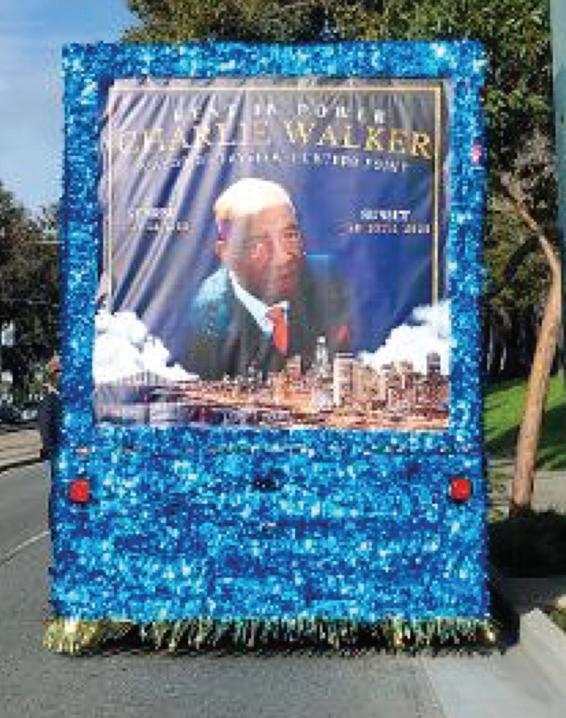
Through an all day and night series of events, Walker was re-
known for chaining trucks together on construction sites where Black people had not been hired.
In 1971, he secured a lucrative contract to clean up an oil spill after two oil tankers collided under the Golden Gate Bridge spilling tons of oil in the Bay.
In a 30-page commemorative booklet of his life, Walker said: “I made $5 million in 30 days.”
“America is still the place” he was often quoted as saying. In Walker’s heart, only in America could a son of sharecroppers, a grandson of slaves, with not even a high school education garner such success. “America Is Still the Place,” the book Walker wrote on that chapter in his life has been adapted into the major 2022 film, “I’m Charlie Walker,” funded by his friend Bill O’Keefe and starring actor Mike Colter as Walker.
Statement by Chief LeRonne Armstrong
Oakland.
In the process, the Mayor shut out critical input from other key stakeholders like the Police Commission, which has rightly commented that there are serious questions about the “credibility and quality” of the Monitor’s reports. Worse, she ignored the Oakland community.
While fighting the troubles of the world Walker blazed a trail creating businesses, opportunities, and promoting education. Walker’s dreams produced lawyers, doctors, engineers and dentists in the family.
Until her untimely death, Walker’s daughter, Yolanda Jones took up the trucking business, which was how her father started out. She had headed Yolanda’s Construction Administration and Traffic Control, where the company secured government contracts and hired and trained people of the community on the business, opening doors of opportunity to members of a sidelined community.
I was wrongly terminated for standing up for the City of Oakland. As the Police Chief, I did my job, and I did it well. I committed no misconduct, I followed all relevant policies and procedures, and I delivered on my promise to implement reforms to bring the City to the goal line of ending federal oversight.
But my termination was never really about the facts of my performance or my ability to lead effectively. My termination was about Federal Monitor Robert Warshaw, and the Mayor’s failure to fight for the Oakland community.
write sensational reports about it -all at Oakland taxpayers’ expense. His conclusions need to be taken with a very big grain of salt, and scrutinized to be sure that they are backed by evidence and that they make sense.
When I pointed that out – the Mayor fired me.
I have read news reports describing the Mayor’s decision to fire me as “bold.” The reality is the complete opposite.
The Mayor promised to bring the community together, listen to their voices, and earn their trust. But as soon as I was placed on leave, the community spoke – loudly – that I had earned their trust and I should be the Chief to finish what I started in implementing critical public safety reforms. I continue to be humbled and grateful for that community support, which unfortunately fell on deaf ears at the Mayor’s office.
membered as a community titan who never gave up as he fought racism and blazed a legacy for his family and the community, while opening doors for fairness in contracting in San Francisco.
Eulogized by Third Baptist pastor Rev. Dr. Amos Brown, Walker was described as a fearless businessman who never gave up a fight.
Brown described one of the many times Walker spoke up for the community. To get his point across at a school board meeting where others were backing down, Brown said Walker jumped up on the table and demanded support for youth of the San Francisco Unified School District.
Story after story revealed the truth about a man that stood for racial equity in contracts and civil rights.
“Today we are celebrating a servant of the people, a champion of social justice, an entrepreneur, and our brother in ‘good trouble,’” said Brown.
Close friend, former San Francisco Mayor Willie Brown recalled the early days and their longtime friendship. Brown described Walker as extraordinary in that while Walker’s companies held some of the largest civic contracts like BART, he and his wife of 63 years, Annette Walker, demonstrated kindness by inviting people with nowhere else to go to his home for every holiday.
“He did social work and wasn’t a social worker. He was heavy duty into education, a community organizer and he was able to brilliantly drown out the noise of racism and distractions to change the city for the better,” said Willie Brown.
In the 1970s, Walker was
San Francisco Mayor London Breed fondly remembered Walker as a friend, supporter and fighter who stood up to white people at a time when Blacks could suffer repercussions.
“He drew attention to the many injustices and stood up for what was right at a time when Black people could be concerned for their lives. Charlie did not back down,” she said.
For San Francisco Councilmember Shamann Walton, Walker was a mentor he referred to as “Uncle Charlie.” “He knew his power when he entered a room and no matter where he was, no matter the conversation, and no matter who was around, he was unapologetically Black and paved the way for me to do the same.”
Businessmen Shelly Tatum and Timothy Alan Simon referred to Walker as a “once-in-a-generation thought leader, businessman, advocate and revolutionary.”
“This gathering is a testament to how much he loved the community, and the community loved him,” said Simon. “His legacy will live on,” said Tatum.
Businessman Dwayne Jones, former Young Community Developers director, said, “He helped me transform my trajectory from a nonprofit director into an entrepreneur and to be unapologetically Black about it.”
Walker’s granddaughter LynTise Jones read the opening scripture at the service (2 Timothy 1:7) “God has not given us a spirit of fear, but of power, love, and a sound mind.”
“If you knew anything about my grandfather you knew he wasn’t afraid of nothing or nobody. He lived fiercely and ferociously for his family, his friends and his beloved community,” said Jones.
For Minister Abdul Rashidullah Muhammad, Walker was a welcoming bridge when his mosque moved into the neighborhood. “Charlie’s living was not in vain. He didn’t let anyone put him down. He used his time to help people,” he said.
Maestro Curtis of the Curtis Family C-Notes credited Walker with helping him create a music studio early in his career. “Walker took me to the music store and purchased everything I needed, $20,000 worth of equipment. Who does that? Because of the quality of music I was able to produce in that studio, I was signed to Earth, Wind and Fire’s label.
A procession of vehicles from Gilman Street traveled past Walker’s Bret Harte Middle School to the New Southeast Community Center along Third Street. A flatbed truck bearing Walker’s mega image with a dozen of his grandchildren in tow, led the way with police and the Kings of Cali Motorcycle Club as traffic escorts.
At the New Southeast Commu-
Mr. Warshaw’s history and incentives are crystal clear. It is the elephant in the room. He is supposed to be neutral, but he is not. It’s in the best interest of his pocketbook to conclude that every error at the Police Department is a scandal that reaches all the way to the top of the organization, and to
She did the easy thing. She accepted the Monitor’s conclusions at face value without weighing the evidence and without asking the hard questions that needed to be asked about the holes in those reports. And she put the City on a path to accepting invalid criticism that could justify more oversight, more checks paid to Robert Warshaw, and instability in a critical public safety role during a time of real public safety problems in
Oakland needs leadership willing to stand up for its citizens and willing to push back on efforts by outsiders to unfairly criticize the progress the City has made. It was a privilege to serve this community for over twenty years, and I regret that my opportunity to take the Police Department across the finish line was wrongly denied me. Oakland deserves better.
Lastly, I want to thank and appreciate the hardworking women and men of the Oakland Police Department. I asked you to trust me and to police the community differently. Treating everyone with dignity and respect. You did! You have highest respect!
Community Leaders Respond to the Firing of Chief LeRonne Armstrong: MAYOR SHENG THAO IS WRONG
come together again with story after story of how Armstrong was ever present in the community and a game changer who has transformed the community and police relations for the better.
“I’ve spoken about federal monitor Warshaw on a national level and have been told Warshaw should have never had the job and that he should be fired,” said Gallo.
By Carla Thomas
The Oakland NAACP and Community leaders are livid about Oakland Mayor Sheng Thao’s dismissal of Chief of Police LeRonne Armstrong. In a press conference just hours before the Police Commission could announce a report of their own, Thao stated she had lost confidence in the chief on February 15, Wednesday afternoon.
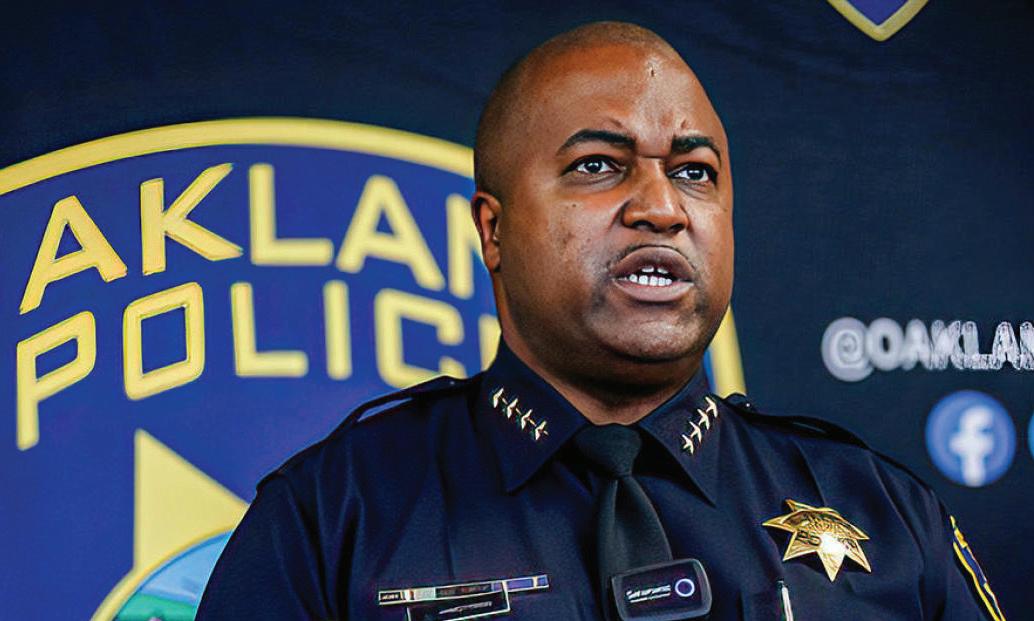
Armstrong who was placed on leave three weeks ago has been left in limbo over a police officer’s misconduct last year involving an accident in a police car and discharging a weapon in an elevator at headquarters. A report accuses Armstrong of not holding the officer accountable. Armstrong has reiterated that he was unaware of the report and by policy the incident is investigated independently.
questioning how a police chief that has a track record of building community bridges and healing a city bruised by violence, could be disparaged and fired when he did nothing wrong.
Hosting a meeting in the Madeline Senegal Fellowship meeting room at his church, Acts Full Gospel Church of God in Christ’s.
Bishop Bob Jackson recalled how he sent a letter representing over 30 organizations to the then mayor supporting Armstrong’s appointment to police chief two years ago.
“This is an injustice and the community has to rise up against this,” said Jackson.
“This is all unfair and we will continue to fight for our chief,” said Oakland NAACP president Cynthia Adams.
nity Center, an art tribute in honor of Walker produced by Malik Seneferu showed the many facets of Walker’s life. From articles of clothing to photographs in Africa and meetings with heads of state, each item included a scannable QR code providing the item’s context with additional video.
Later that evening, SF Black Wallstreet presented a Lenny Williams concert in Walker’s honor. The audience danced and sang along to Williams’ hits, as the famous R&B crooner belted out “’Cause I Love You,” “This Time It’s Real,” and “You’re Still A Young Man,” among others.
“Charlie
A partial statement released by the City of Oakland Police Commission reads: “The Commission voted for a Discipline Committee to explore these issues and in particular the allegations against the Chief...the Commission was not informed of the Mayor’s decision to release the Chief before her press conference...We are sorry those an effective reform-minded Chief who led the OPD into compliance in the 51 out of 52 tasks of the Negotiated Settlement Agreement “ Federal Monitor Robert Warshaw, who has overseen the Oakland Police Department for 2 decades, has amassed a small fortune at $100,000 a month of the city’s budget. With the Department just months away from having the federal oversight removed, and 51 of the 52 points within the NSA (Negotiated Settlement Agreement) complete, city leaders are now
The NAACP is calling on everyone to join a rally at city hall at noon on Monday, February 20 to protest the mayor’s decision. By their standards, the chief should be exonerated, the confidential reports that were leaked should be investigated, the federal monitor who has been fired as a monitor in cities such as Detroit should be investigated, and the Police Commissions investigative reports should have had a complete due process that demonstrated again that Armstrong was not at fault.
Armstrong thanks the community and city leaders for their support.
“I really appreciate all of this support and your prayers. It’s keeping my family and I strong,” he said.
Leaders of the Chinese, Latino, church, business and Black community communities along with Oakland City councilmember Noel Gallo, former councilmember Oakland City Councilmember Loren Taylor among others, have
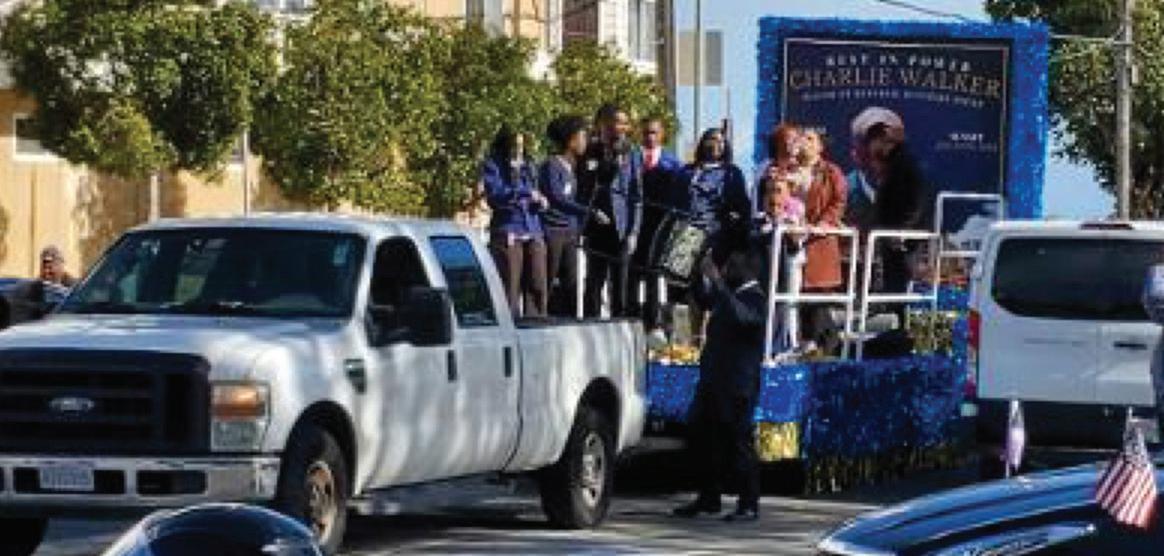
Pastor Phyllis Scott, president of The Pastors of Oakland, spoke of a graduation in the community where Armstrong signed everyone’s diploma. “He has done tremendous work in East Oakland,” she said.
At noon on Thursday, small group of community members expressed their dismay of Armstrong’s firing outside City Hall at Oscar Grant Plaza. Oscar Grant’s mother, Wanda Jones, CEO of the Oscar Grant Foundation questioned why there are so many chief’s fired under the federal monitor. “Every time we get a new mayor, the police chief is gotten rid of and that’s unacceptable,” said Jones. “We know that mayor’s bring in their own staff, but the way the mayor’s gone about doing this is wrong. The chief should not have been fired.”
Community elder and historic Black Panther member, Rosalind Charlotte Patton said saw the chief’s firing on the news the night before and rushed to the rally with a sign in support of Armstrong. She said she wanted her voice heard even if she wasn’t a speaker bearing a sign stating: “ Mayor Sheng Thao you are dead wrong, the community supports Chief LeRonne Armstrong.”
Community leaders Seneca Scott, Loren Taylor, Brenda Grisham, Jorge Flores, and Antoine Towers also spoke at the rally in support of Armstrong.
Scott echoed the NAACP and community leaders is demanding the chief be exonerated, that the investigative reports that were leaked be investigated, and the federal monitor be investigated.
“We will continue to fight this,” he said.
postnewsgroup.com THE POST, FEBRUARY 15 - 21, 2023, Page 12
was a man of the people, and we will miss him,” said Williams.
Homecoming services of entrepreneur and community leader Charlie Walker at Third Baptist Church in San Francisco. Flowers formed letters spelling out Walker as the mayor of Bay View Hunters Point BVHP. Photo by Carla Thomas
Chief LeRonne Armstrong explains to the public how he was wrongfully terminated.
A flatbed truck bearing the image of Charlie Walker includes his grandchildren leading a procession from Gilman Street and down Third Street to the repast at the New Southeast Community Center.
Photo by Carla Thomas.
The back of a flatbed truck shows the image of Charlie Walker as it makes its way through traffic in San Francisco on the day of his funeral. Photo by Carla Thomas.












 By California Black Media
By California Black Media

 By Ben Jealous
By Ben Jealous










 By Post Staff
By Post Staff
 By Carla Thomas
By Carla Thomas





 By Tamara Shiloh
By Tamara Shiloh







